#Kintyre Turn
Explore tagged Tumblr posts
Text
Understanding Lennon McCartney Rewatch Part 4.1
This is embarrassing but I'm actually so obsessed with the first five minutes of this episode that I've got it bookmarked in my YouTube account. It's just so perfect!
“Say you don't looooove him, my salamander. Then why did you neeeeeeed him? Ono don't answer.” He genuinely thinks need and love are the same and I really hope he's got therapy for that messed up mindset by now.
Officially honored as the most successful musical composer and recording artist of all time. That damn well better be mentioned in his movie. And people still don't take him seriously. But also. John definitely smashed his TV.
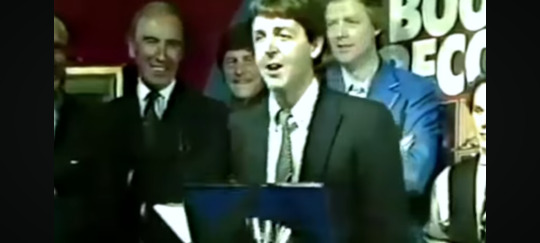
I'm screaming. I love Linda the promoter so fucking much!! Interviewer: I knew a lot of your records had went gold and platinum and– Linda: a lot of them? All of them! Ugh I wish she was still with him now.
And then THIS! “What really happened between you and John?” As the first notes to “I Will Survive” play. It's too good. Everyone has to go watch that bit right now.
Linda coming in for the kill again with her fake posh accent: critics? Critics? Oooooh! … They're always three years behind.
Look at him (to the tune Bitch by Meredeth Brooks) he's a whore, he's a father, he's a star, he's a success, he's a lover he's smug, he's laughing, he's having fun, he's working hard. He's everything.
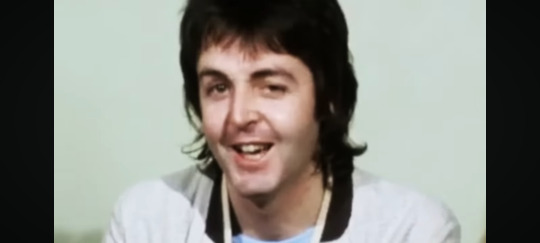

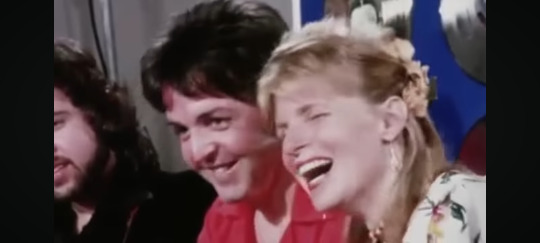

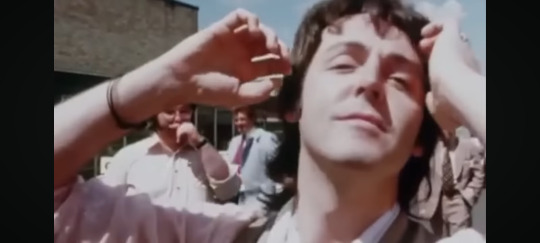
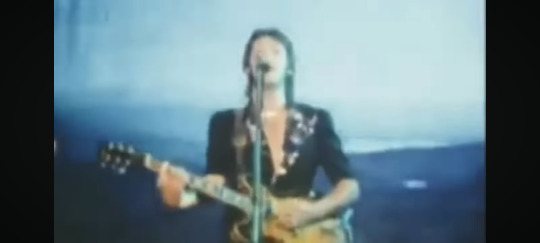
Interviewing Wings concert goers and this one girl goes, "oh I just got off on all of it" and another one goes “It was great, i came twice!” Literally it should've been me!!!!
The McCartneys are seriously such a big family. And it's been Paul's responsibility since was about 21, really, to make sure they're all okay financially. That Francie story of him crumbling in the street in Liverpool haunts me.
"Why shouldn't they go to the same school as everyone else goes to?" State schools should be the only legal schools btw.
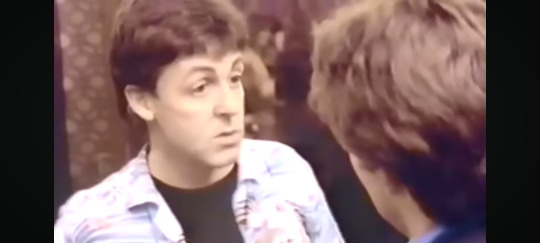
I love what the creator does to contextualize their songs by pairing them with other contemporary footage. It makes it much easier for me to understand why something like “arrow through me” (which I love but none of the people I've shown it to do) would've been so popular.
Oh here we go again. Just show us the marriage certificate already.
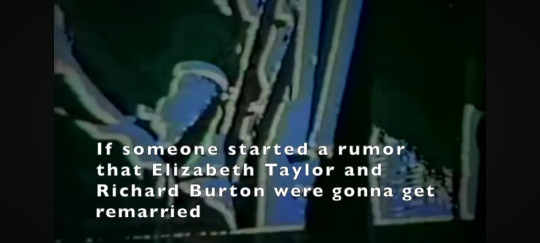
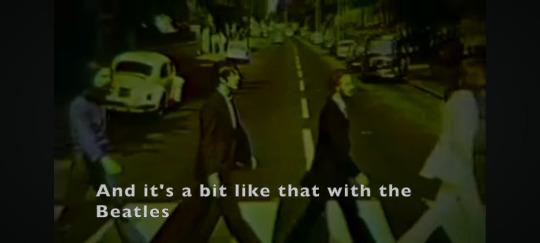
Cackling at the contrast between “Old Siam Sir” which is one of my all time fav rockers and footage of the Stones being cringe AF and Dylan being so beyond done he's basically dead.


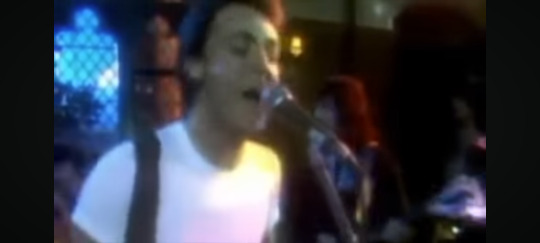
Oh. Okay. And then they slap us in the face with John's poor baby late 70s demo voice crooning, “Don't want your looooove. Anymore.” “I die each time I hear your name.” I'm fine. It's fine. I'm just vomiting my guts out because I'm sick. That's why.
The pairing of “Mr H Atom” with Paul's would've-been drag show is genius, but what is that clip of some sort of trial stuck in there? If anyone knows, please inform me. (16:15)
John sounds so sad talking about the “endless search for . . . Scotland . . . Within an hour of New York.” I can't help thinking of the Mull of Kintyre. But John was also the one who turned Paul on to Scotland in the first place, ≈always waxing poetic about the heather and the hills≈.
Sean is so adorable. Reminds me of my little guy a bit actually.
Why do I always want to tell Paul to be nice to John? John is worse to him. Idk maybe because John's pain is more visible.

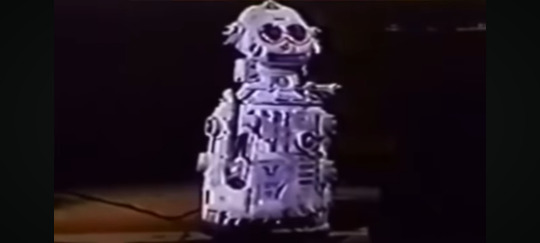
91 notes
·
View notes
Text


On December 12th 1939, 9 miles off the Mull of Kintyre, the D class Destroyer, HMS Duchess was sunk after a collision with another ship.
This is the story as told by a survivor. It was an icy, black, December night and the destroyer, "Duchess" was heading home to the north of Scotland. Only another hour and she could dock at Greenock, at the end of a spectacular, record - breaking passage from East to West. The declaration on of war on Germany in that ; September of 1939, had been the signal for the flotilla of nine ships --all 'D' Class destroyers -- to leave their Chinese port, with the instruction to set sail for the 'friendly' waters of the U.K. with "the greatest possible speed". It had been a rare experience, an impressive and morale - boosting sight for the crew of the "Duchess", as they had steamed away in single file and at thirty knots, heading for refueling at Singapore On they had gone at break-neck speeds, beyond Colombo, Aden and into the Suez Canal. Here, the other shipping had been halted to ensure the flotilla's unimpeded progress to Malta. At Malta, three of the destroyers -- "Duchess", "Dainty", and 'Delight" -- were detailed to escort the Battleship "Barham" from Gibraltar to Scotland.
The "Barham" was a mighty ship. A veteran of previous skirmishes with the German fleet at Jutland in 1916. A massive vessel of some 31,000 tons, she dwarfed her escorting destroyers. The battleship and her escorts followed the usual pattern of submarine - avoidance by zigzagging, making it difficult for an enemy submarine to obtain a 'fix' on the ship. It had been a lightning trip -- perhaps the fastest East - West passage ever recorded and the crew of the "Duchess" were rightly proud of their achievement, as, in the early gloom of a December morning, she zigged and zagged her way towards the Hull of Galloway. The majority of the crew were below, asleep and the Petty Officer on watch had closed down all but one of the gunnery implacements, held a roll - call of his ten gun crew and ordered them to go below, to secure their hammocks, To clear the way for their messmates at breakfast. Only a young Ordinary Seaman, a 'boy sailor' called Ernest Swinhoe, was left up top at the 'A' gun. He was the 'communication number', the sailor on watch at the 'fore - gun. As the junior rating, he had been given the icy, early morning duty and he envied his gunnery mates their chance to go below into the warmth of the mess.
Ern had been lucky to join this destroyer, to be a part of the friendly crew of the "Duchess", along with his good friend Peter Port. Peter was his best mate, the lad who had shown him the sights of Hong Kong, before they had left the East,
They had both felt privileged to be a part of this record- breaking destroyer flotilla. As an electrician, Peter was fortunate, he thought, to be below in the warmth of the low power room. Safe from the biting chill of a Scottish strait.
It was 04OO hours now, and the watch had begun. Only an hour of this and they would be home and dry. Ern stood in the shelter of the gun shield, to avoid the wind.
There was a blackout and the absence of moonlight made it a coal-black night. He adjusted his headphones and looked aft. It 3. was then that he saw the massive shape of a ship's prow bearing down on him out of the darkness.
It towered over the diminutive destroyer and with a sickening sound, hit the "Duchess" at about half way and with such tremendous speed, that she simply turned the destroyer over. As she. 'turned turtle' Ern dived into the cold black sea, as other, half - naked sailors scrambled desperately round the rolling hull.
The "Barham's" searchlight lit up the scene, It had been her towering form that had pushed the "Duchess" over. Her crew felt sure that they had hit an enemy submarine, as the "Duchess'" upturned asdic domre looked just like a conning tower. But, when her searchlight beam moved aft, it revealed the awful truth -- the sight of a ship's screws, still turning --and her horrified crew began to sweep for survivors. The water was freezing and oil - ridden. There had been no time to grab lifebelts and Ern pushed off his rubber boots and overcoat, alternately treading water and floating on his back. Out of the blackness, a drowning shipmate struggled towards him. He was naked and desperate and Ern realized from his 'Ganges' training, that the condemned boy would use him as a lifebelt - and so, condemn them both.
Ern swam away to a reasonable distance, until the poor fellow disappeared. The light from the "Barham" lit up the side of the upturned "Duchess" and Ern could clearly see the faces of frightened men, shouting through tiny portholes, from which they were unable to escape. On the fast - disappearing hull of the "Duchess", men were clinging on, until the "Barham" pulled alongside, plucking them to safety, only moments before the boilers of the "Duchess" blew and she disappeared. beneath the waves, taking her entombed crew with her. The "Barham" and her other destroyer escorts, lowered boats and Ern began to shout to them. He realized that he had been in the water for some time now. His chances of survival were diminishing for every minute he was left in that icy waste. Suddenly, he heard the sound of a rowing boat and a coxswain shouting, "Oars!" The men stopped rowing now and the coxswain shouted again for silence.~ Ern summoned up ~'what little strength he had left and called for help. He was aware of a ship's lifeboat coming alongside and pairs of arms reaching out to pull him into the craft. He felt numb as the cold air hit him and he pleaded with his rescuers to put him back into the water, where it had felt warmer. When he reached the safety of the "Barham' he was a shaking mass, unable to warm himself through.
He was severely hypothermic and had 'been lucky to survive. His rescuers had pulled him out of the water at some minutes after 0500 hours, which meant that he had been in the water for an hour -- beyond a reasonable amount of survival time for conditions such as those on that December night. As he recovered, Ern learned that he was one of only twenty - three survivors from the ill - fated "Duchess" and, her crew of a hundred and sixty men. His fate had rested on the timing of his watch duty. He had possibly been the only sailor aboard to see the fateful collision, when the zig and zag of the two vessels had coincided. His heart went out to his mate, Peter Fort, who had been below at the point of impact. He couldn't possibly have survived and Ern hoped that he had known little of what was happening,' as he and a hundred and twenty - three others perished in what was officially described at the time, as, "One of those unfortunate accidents of war." More than fifty years have passed since that accident and my father --
Ordinary Seaman Ernest Swinhoe still remembers the events of December 12th. 1939, as if it happened yesterday. He can recall the cold, misery and confusion. The anguish of seeing entombed sailors shouting from tiny portholes, the pain of losing a good friend and the guilt of seeing a shipmate drown before his eyes. Since that day, however, ships have had escape hatches built into their sides, to prevent the fate that befell many of the "Duchess'" crew. While her demise had not been as 'newsworthy' as that of the "Hood", the "Bismarck", or -- later -- the poor old "Barham" herself, lessons had been learnt from this awful night in 1939.
9 notes
·
View notes
Note
do you think extinct gaelic dialects could possibly be revived (saying nothing of the likelihood of that happening) if enough people were to make an effort in learning/speaking them? sometimes i look at old dialects as a learner and wish somehow they could be brought back
Depends on the dialect and how extinct they are. First of all, people like to speak of some dialects as extinct when they're not yet, they're just very threatened. For example, there is a still a native speaker of Perthshire Gaelic alive - she's 104 but she's still kicking. The same for Easter Ross Gaelic - still has one old woman who's a native speaker, a fisherwife in the village of Brora. Her sister passed away last year, making her the last native speaker, but she's still around. One family has kept up Tayside Gaelic for two generations now, and other speakers could learn to speak the local language from them. Other dialects have semi-speakers, aspects of which could still be picked up though it would not be the complete dialect as gained from a fluent speaker - for example, the son of the last native speaker of Aberdeenshire Gaelic is still alive, and he, while not fluent, is competent in the languge and can recite some poems and rhymes from memory that his mother taught him which will be enough to save some vocabulary and phrases, should someone decide to pick it up.
Then there are dialects who's last native speakers have passed away, but where fluent learners actually did what we're discussing here, and learned the dialect to fluency at those last speakers knees - examples just based on people I know at least somewhat personally would include north Argyle, Dùthaich MhicAoidh, Wester Ross, Glens of Loch Aber and Glen Coe. These dialects, then, also have a lease of life, and could be learned and spoken with now living speakers.
A third category would be dialects which, while extinct, were extensively recorded before their death and which could be picked up with a degree of continuity from those recordings. Isle of Arran, for example (which I know at least Alasdair Paul is doing for his historical novels, who's characters speak with a clear Arrannach flavour), or Badenoch, or Lorne (the last native speaker, Iain MacPhàidein nach maireann, passed away not five months ago), among others. All of these I would say could all be revived and be said to be genuinely the same dialect, even though it will of course change and loose some of it's flavour, and certain sayings or words that just simply were never recorded.
However, there is a last category of dialects that are irreparibly lost, that simply were not recorded in time. Loch Lomondside Gaelic, for example, died out in the early 20th century, and the only extensive collection that happened locally, by Dòmhnall Dewar, was not a linguistic but a folkloric study. The same goes for most of the borderlands and the Southern Highlands, (Cowall, Kintyre, Black Isle, South Argyle, Braemor, and Bredalbane, etc) and generally most districts outwith the crofting region, where the languge (as well as more or less the entirety of the people) disappeared with the clearances, without the lease of life granted by crofting and the crofting act. This goes doubly so for the only dialect of Lowland Gaelic that survived into modern day, in the form of that Gaelic which was spoken in the Glens of Galloway into the 17th century. These dialects are all lost completely. But, as you understand from the earlier list, a surprising number of dialects are still alive and to some extent kicking, and could have a fighting chance if things were to turn out differently. I can give you some tips or contacts if the dialect you yourself is interested in is salvageable, just DM me or send another ask if whatever.
76 notes
·
View notes
Text

Scotland - country of my birth, of my choice and forever my home. I love it….immeasurably! Every day I’m blown away by its breathtaking scenery, colourful culture, captivating history, and the genuine warmth of its people….even its infamous weather! (The Big Yin says: There's no such thing as bad weather, just the wrong clothing, so get yourself a sexy raincoat and live a little.” True dis!! 😂)
I feel I know this glorious nation upside down and inside out, however, occasionally it throws me a curve ball that brings new and deeper meaning to the word quirky….and I love it even more!!
While explaining what I believe to be our particularly user friendly words ‘scunnered’ and ‘louping’ to someone the other day, I was reminded of a trip I made to the Isle of Gigha and the crazy liguistics us folk of the North get up to!
After a morning discovering the Bodach and Cailleach standing stones, I headed back to civilisation - and by civilisation I mean the one hotel where the ferry comes in! - for a cup of coffee. Attached to the old building was a new extension which housed a gallery of local artists work. This was also where you could get a fairly decent cappuccino. With coffee in hand I wandered round the paintings and craftwork, really appreciating how much they captured island life. There was a particular set of paintings that drew my attention, imbued with all the colours you would find as you walked the sandy shores and hidden pathways of Kintyre. I moved closer to read what the descriptions said. Each one was in Gaelic. I made a half hearted attempt at translating with my incomplete knowledge, but eventually gave up and asked the gallery owner if they could help. She happily obliged and took me through them all. At the last one she paused and said, “This one is called ‘Ròmhan’.”
“It’s beautiful,” I replied in all honesty. “What does it mean?”
She gazed solemnly back at the painting. A moment passed before her mouth twitched - just a little, right in the corner. She turned and stared me straight in the eye.
“It translates,” she proudly declared, “as…..’the sound a cow makes while choking on a potato’!” 😂
So there you have it, we may not have words for computer or television in the language of our ancestors, but we do have one that perfectly sums up the groan of a cow with a potato stuck in its throat! And that my friends is another level of hilarious bizarre that I will forever love. ❤️ 🏴

(The Bodach and the Cailleach - the Old Man and the Old Woman - Isle of Gigha)
3 notes
·
View notes
Text
Rachel’s Chart Chat 41 from People are the Enemy Podcast Mini Episode 9 dated 12/07/2022
‘70s chart: 1978-11-25
#68 A Little More Love - Olivia Newton-John #51 Every 1's A Winner - Hot Chocolate #42 New York Groove - Ace Frehley #34 I'm Every Woman - Chaka Khan #24 Don't Want To Live Without It - Pablo Cruise #9 Time Passages - Al Stewart #7 I Just Wanna Stop - Gino Vannelli
Kiss solo albums showing their coordinated covers

"anything you want, dumb baby"
Whitney version of "I'm Every Woman" for you to compare/contrast with Chaka's
youtube
'80s chart: 11/28/81
#90 Anyone Can See - Irene Cara #79 I Heard It Through The Grapevine (Part 1) - Roger #36 Poor Man's Son - Survivor #33 Never Too Much - Luther Vandross #27 Turn Your Love Around - George Benson

Roger says hey
Stallone loving "Poor Man's Son" as cited on wiki
bonus chart fact from @mantzouks about Mull of Kintyre
Chart Picks Playlist - new songs which were discussed in the segment added each week, at the bottom. 1970s AT40 and 1980s VJ Big 40 - Rolling Playlist of the full Hot 100 for the current and previous week.
5 notes
·
View notes
Text
Day Fifty-seven
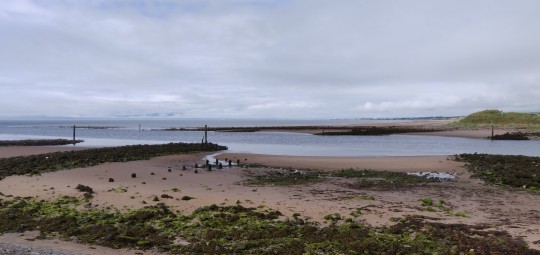
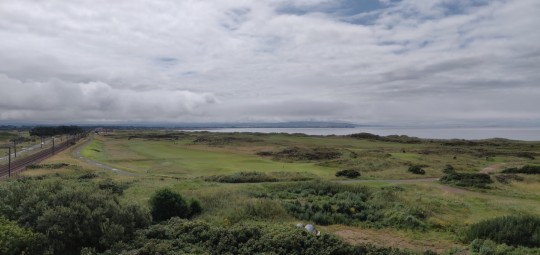
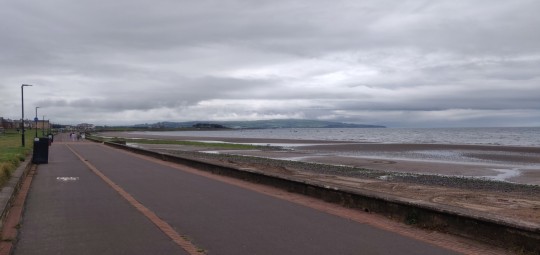


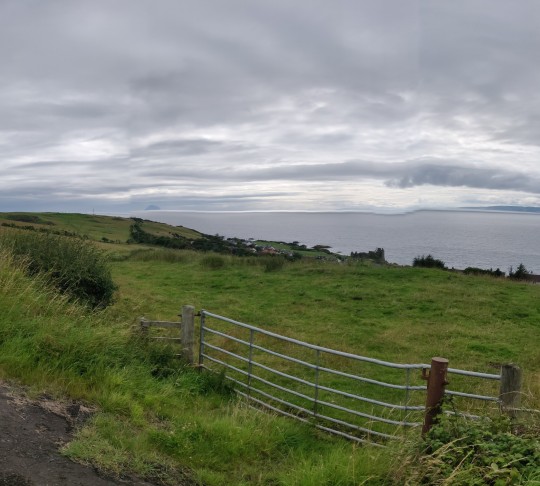


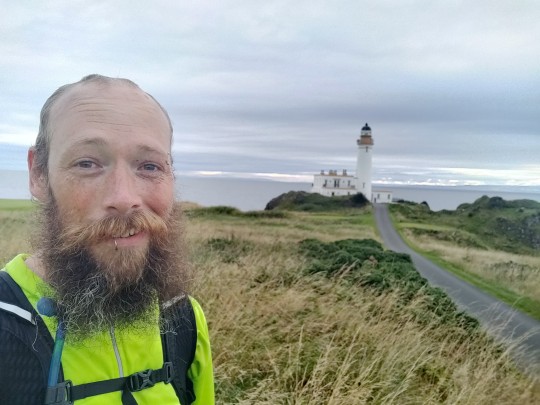

The rains yesterday evening managed to carry on solidly through the night and well into the morning today, so rather than get everything soaked I had a chill start to the day waiting them out, allowing me to finally get up and underway a little before noon. No need to rush!
Along the trail over the now swollen River Garnock, it's a gentle ride into Irvine through some pretty memorial gardens and around the local golf course, before rolling down past the harbour to take in the beach view at the end of the River Irvine.
With ideal timing, the sun emerges as I take in the view here. Should hopefully be a good day!
Following NCN Route 7, it's more very welcome off-traffic riding as the trail dollows through some lovely gardens and woodlands, before swinging back down to the shore at Troon.
A bite to eat is had at Barassie Beach, then the ride continues around the harbour and continuing south.
The cycle path runs alongside the A79 for a stretch past Prestwick Airport, before heading down through the town itself.
I spy Ayrshire Cycle Services on the ride through, and having had my bike's bell damaged at some point in the Highlands I take the opportunity to stop off for a replacement and to top up my tyre pressure.
I'm not sure exactly when the bell actually broke, but as it's been all road riding for weeks it hasn't been needed or noticed. Now I'm back in the land of dual-use cycle and pedestrian paths, it's an invaluable piece of equipment and I'm glad to have it back to save me having to constantly slow down and ask people to excuse me!
On from Prestwick, it's along some juddering coastal paths into Ayr, where I have another stop to get some more gas for my stove.
Back on the bike, it's down to the beach for a lovely long flat ride along the promenade, with some great views over the water.
The clouds are starting to gather a little by now, but they don't look too horrible for now, and a cooler day makes for easier work.
Which is necessary, as a little further after crossing the River Doon I come to the end of this great section of cycle paths and it's time to hit the A719 to continue up and over the cliffs further round the coastline.
The climbs up aren't too much fun with the busy traffic, but after a couple of days of easy riding and with gentler gradients, the legs are in good shape to slog up and over them.
As the road climbs higher it does at least being some beautiful views across the Firth of Clyde and I can see the end of the Kintyre Peninsula across the water. This is far easier work than being back there!
Continuing on up to Dunure, the air has turned misty with moisture but can't quite bring itself to rain down properly. With it hitting rush hour, I don't relish the thought of the road being even busier, so take a bit of shelter to have a good spot of dinner to wait out the worst of it.
By 6pm, the road has quietened significantly, so it's off once more, around the corner with a lovely view of the woodland hills ahead and Culzean Castle overlooking the coast.
There's some more hills to climb up as the road passes through the castle estate with its plentiful trees, and some bone-juddering road surfaces on the next downhill announce the arrival into Maidens.
With it starting to hit 7pm I'm feeling it's time to find a spot for the night, so uphill out from Maidens and a little further down the road is a turnoff to quickly stop by at see Turnberry Lighthouse, before a little backtracking allows finding a lil patch of trees off the golf course to pitch up and have a nice lie down.
After a few very soggy nights, I'm hoping the rains will relent tonight to allow the tent to finally get a little dried out, but we'll see what happens!
TTFN!
2 notes
·
View notes
Text
Today, the Church remembers St. Columba, Abbott of Iona.
Ora pro nobis.
Saint Columba (Irish: Colm Cille, 'church dove'; Scots: Columbkille - 7 December 521 A.D. – 9 June 597 A.D.) was an Irish abbot and missionary credited with spreading Christianity in what is today Scotland at the start of the Hiberno-Scottish mission, which followed the migration of Northeastern Irish colonists to the west coast of Scotland, which had been going on for hundreds of years.
In early Christian Ireland, the druidic tradition collapsed due to the spread of the new Christian faith. The study of Latin learning and Christian theology in monasteries flourished. Columba became a pupil at the monastic school at Clonard Abbey, situated on the River Boyne in modern County Meath. During the sixth century AD, some of the most significant names in the history of Celtic Christianity studied at the Clonard monastery. The average number of scholars under instruction at Clonard was said to be 300. Columba was one of twelve students of St Finnian who became known as the Twelve Apostles of Ireland. He became a monk and eventually was ordained a priest.
In 563, he travelled to Scotland with twelve companions (said to include Odran of Iona) in a wicker currach covered with leather. According to legend he first landed on the Kintyre Peninsula, near Southend. However, being still in sight of his native land, he moved farther north up the west coast of Scotland. The island of Iona was made over to him by his kinsman Conall mac Comgaill King of Dál Riata, who perhaps had invited him to come to Scotland in the first place. However, there is a sense in which he was not leaving his native people, as the Ulster Gaels had been colonising the west coast of Scotland for the previous couple of centuries. Aside from the services he provided guiding the only centre of literacy in the region, his reputation as a holy man led to his role as a diplomat among the tribes.
There are also many stories of miracles which he performed during his work to convert the Picts, the most famous being his encounter with an unidentified animal that some have equated with the Loch Ness Monster in 565. It is said that he banished a ferocious "water beast" to the depths of the River Ness after it had killed a Pict and then tried to attack Columba's disciple named Lugne. He visited the pagan King Bridei, King of Fortriu, at his base in Inverness, winning Bridei's respect, although not his conversion. He subsequently played a major role in the politics of the country. He was also very energetic in his work as a missionary, and, in addition to founding several churches in the Hebrides, he worked to turn his monastery at Iona into a school for missionaries. He was a renowned man of letters, having written several hymns and being credited with having transcribed 300 books. One of the few, if not the only, times he left Scotland was towards the end of his life, when he returned to Ireland to found the monastery at Durrow.
Columba died on Iona and was buried in 597 AD by his monks in the abbey he created. In 794 the Vikings descended on Iona. Columba's relics were finally removed in 849 and divided between Scotland and Ireland. The parts of the relics which went to Ireland are reputed to be buried in Downpatrick, County Down, with Saint Patrick and Brigid of Kildare or at Saul Church neighbouring Downpatrick.
O God, by the preaching of your blessed servant Columba you caused the light of the Gospel to shine in Scotland: Grant, we pray, that, having his life and labors in remembrance, we may show our thankfulness to you by following the example of his zeal and patience; through Jesus Christ our Lord, who lives and reigns with you and the Holy Spirit, one God, forever and ever.
Amen.

4 notes
·
View notes
Text
TWENTY-FOUR
Smiles in the sunshine and tears in the rain
Still take me back to where my memories remain
Flickering embers grow higher and higher
As they carry me back to the Mull of Kintyre.
PAUL MCCARTNEY & DENNY LAINE (1978)
THE ZOOLOGIST James Wilson stood on a boat not far from here one beautiful summer’s evening in 1841. It was calm. It was still. Lights gleamed along the shore, and there was ‘a peculiar concerto between sea and land’. He jotted: 'A shoal of porpoises was tumbling and blowing in the bay, while the dry monotonous craik craik of the land-rail was as distinctly heard as if we had been anchored in the middle of a clover field.'
Nikki and I are sheltering in the doorway of a disused shop in cold, wet Campbeltown. I’ve an electronic version of Wilson’s A Voyage round the coasts of Scotland and the Isles on my steamed-up phone.
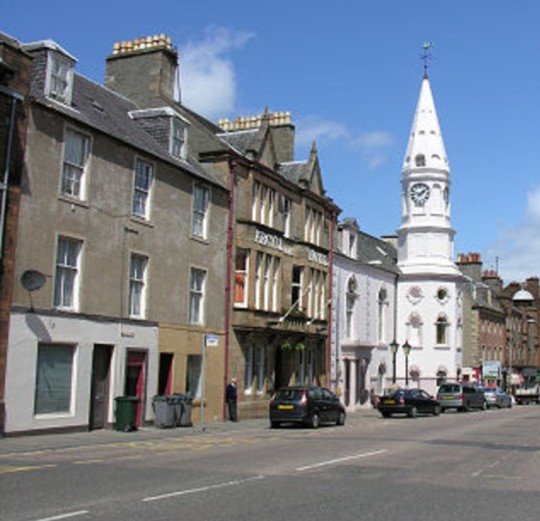
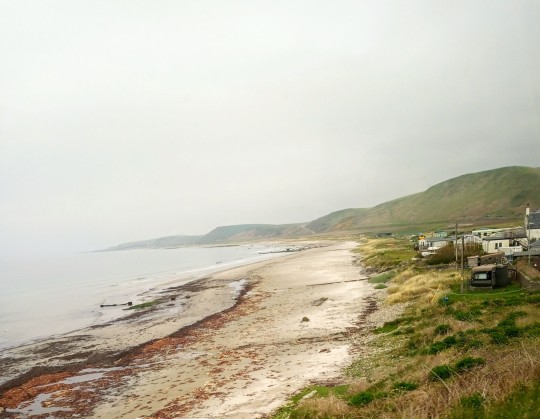
There is a shower of the kind of rain that looks less wet than it turns out to be. There are no seabirds or cetaceans in sight. It’s a damp day at the stub end of April. We are in between showers in Kintyre, that arm of land that reaches down the map to meet the ocean beyond the Mull. I have mislaid my rain-proof trousers. Had my dear father, who died while I was writing this book, been standing beside me, he’d have advised me, as he had done during a storm when I was eight: 'If it disnae kill you, it’ll cure you, boy. Your skin’s waterproof, either way.'
For some folk Kintyre may be the road to nowhere, but Scotland was more or less born here: as dreamy Dál Riata, the kingdom of the Gaels from Antrim, who settled here at the end of the fifth century. John Macculloch wrote, of Campbeltown itself (The Highlands and Western Isles of Scotland, 1824): 'A more picturesque and beautiful situation for a maritime town could not well be found, and, from different points, it presents some fine views; uniting all the confusion of town architecture with the wildness of alpine scenery, the brilliancy of a lake, and the life, and bustle, and variety, incidental to a crowded harbour and pier.'

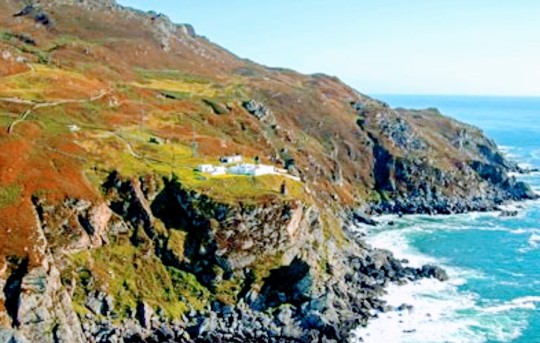
Visitors to Kintyre used to arrive by sea. Most now take that long and winding road from Glasgow to Campbeltown, but the last leg of it, down the A83 from Tarbert, is relatively straight: it edges a raised beach lashed by the Atlantic rollers of the west: a wild seaboard gashed by mini ravines that have no right to be so close to so sandy a littoral. A glacier maybe dumped them one after a jagged other to become rocky outcrops. Shards and larger boulders. Mini-pinnacles. Seabirds of several species perch out on a scar there today and I’ve counted, what, 20 cormorants. A sight to behold, as we unwind from jumping off the bus to help the driver release a lamb trapped in a fence.
Here, from the Glasgow bus, you can, in fair weather, marvel at the distant outline of the Paps of Jura undulating their strangeness out on the horizon. After a while the road turns inwards for a few miles to reach the ‘wee toon’, which is fringed by a sweeping horseshoe bay beneath hill-land. Wee Campbeltown was once the capital of the old Gaelic kingdom. At the end of the 19th century it was a boomtown – one of the richest towns per capita in the UK, and so full of distilleries that they called it Whiskyopolis.
In the game of snakes and ladders that is Scotland’s economy it wasn’t always that way. Campbeltown had been the chief town of the Lords of the Isles, and effectively the capital of Scotland before Edinburgh was thought of, although Pennant observed in 1772 that it had risen in less than 30 years from ‘a petty fishing town to its present flourishing state’:
'About the year 1744 it had only two or three small vessels belonging to the port: at present there are seventy-eight sail, from twenty to eighty tons burthen, all built for, and employed in, the herring fishery ; and about eight hundred sailors are employed to man them. This town in fact was created by the fishery.' (A Tour in Scotland, and Voyage to the Hebrides)
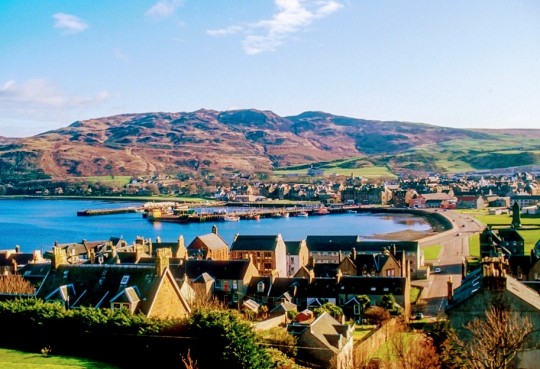

By the time the Rev. Daniel Kelly penned his entry for the New Statistical Account of Scotland in 1843, 500 families fished here but he stressed that ‘the great staple commodity of this place is the distillation of malt whisky’. There were then 25 distilleries, 76 pubs, and an Excise Office that employed 50 people.
The deep harbour was ideal for whisky to be steamed out to markets in the UK and America. Whisky tycoons built villas as grand as any erected by shipping magnates elsewhere. But the distilling industry was ultimately a victim of its success. The demand for liquor was so great that the distilleries concentrated on quantity rather than quality. The killer blow was a series of rises in spirit duties. When the 1911 census revealed an eight per cent drop in population over the past 10 years, the Argyllshire Herald declared:
'The removal from town and district of the best and most virile of our youth continues. There is but one way to stem the tide; that is, by the promotion of some new local industries.
'It remains for somebody to take the initiative, to devise new industries and so resuscitate the trade of the town, otherwise the decline will certainly continue.'
The paper noted that 37 people were emigrating every week, mainly to Canada. The distilleries began to close. There are now only three – in a town that was identified in 2013 as one of the most vulnerable in Scotland, and one of the most remote in the UK. Fuel poverty rates were nearly double the national average then. Professor Cliff Hague, chairman of the Built Environment Scotland, stated in a report: 'Like so many small towns, Campbeltown has been the plaything of forces beyond its own control. Its traditional industries – whisky, shipbuilding, fishing, forestry and tourism – have all experienced restructuring, and the same is true for agriculture which was once the mainstay of the surrounding area.'
There are encouraging signs. Glen Scotia Distillery’s 25-year-old malt has been crowned the world’s best. In the 2021 SURF awards for best practice in regeneration, Campbeltown was judged to be ‘Scotland’s most improved place’ (As many as 40 industrial buildings had received investment that totalled £13 million).
In 2023 plans were lodged for a ‘net zero’ distillery in the erstwhile whisky capital. The Brave New Spirits brand will be distilled at Witchburn Distillery in the former RAF Machrihanish airbase, which the community bought for £1. Their target is two million litres of alcohol per year, powered by 100% renewable energy and heat and energy recovery systems. The former NATO base operated as an airfield for nuclear-armed V-Bombers, for maritime aircraft hunting Russian submarines in the North Atlantic, and during the testing of Concorde.
The local populace, moreover, successfully fought plans to convert Scotland’s oldest atmospheric cinema, Campbeltown Picture House, into flats. It opened its doors the year before a young Charlie Chaplin signed for Pinewood Studios. It is still showing flicks.
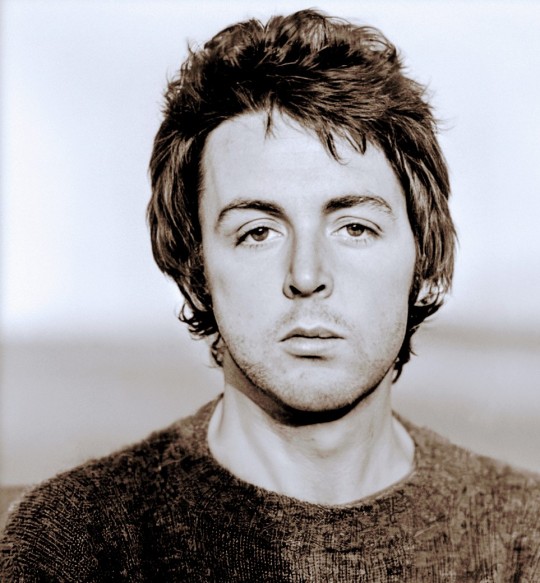
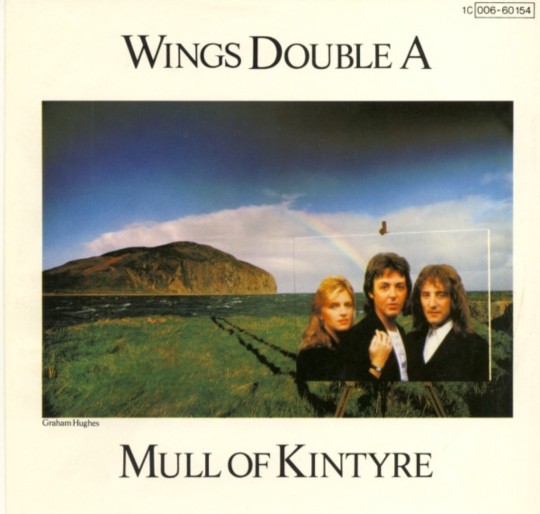
Paul McCartney’s association with Kintyre is well documented. In 1966 he asked his accountant to find him a hideaway from the world of autograph-hunters and Beatlemania. He came up with High Park, an isolated farm on the moors near the Mull of Kintyre, which became the subject of one of the best-selling songs of all time in Britain. Very few people visited the Beatle in his far-flung bolthole. But Peter Brown, who was best man at John Lennon’s wedding, revealed in his biography of The Beatles, The Love You Make (2002):
'Paul summoned Alistair [Taylor, his office manager] to High Park so that he could pay a visit to the local pharmacy for him. According to Alistair, Paul had the crabs and needed a pesticide to shampoo with.
'Being Paul McCartney, the neighbourhood celebrity, Paul was too embarrassed to ask the pharmacist in the small town for the pesticide himself, so he sent Alistair. There was also a sense of urgency to this mission, lest Paul give the tiny parasites to Jane [Asher], who would most certainly realize he had been unfaithful to her.
'The town pharmacist was baffled by Alistair’s request. He had nothing for that purpose other than "sheep dip", which was used to delouse cattle. Paul presumably made do with that.'
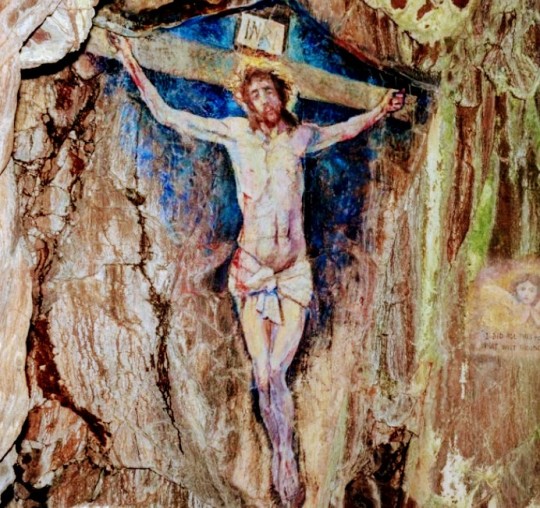
In August, 1887 an unnamed boater rowed ashore in Campbeltown loch to stretch his legs. He wandered into one of the seven caves that notch the south of Davaar island, struck a match to light his pipe – and fainted. The following day hundreds of townspeople ran along the shingle causeway to the island brandishing byre lamps and candles. There in the cave was a life-size mural of Christ on the Cross. The Campbeltown Courier informed its readers:
'Nothing could be more suitable for the contemplation of such a subject than the semi-darkness and rocky grandeur of the large cavern in which the picture is placed.'
An embarrassed local art teacher, Archibald Mackinnon, owned up to being the creator of the fresco.
Locals said Mackinnon, who attached a brush to his walking stick to paint the high features in the cave, fearing the consequences of having used the school’s raw materials to paint the mural, did a moonlight flit soon after press coverage. He turned up in Grantham, where he became an itinerant artist. There are reports that he used hair from his nagging wife’s head to make brushes. Journalists reported his subsequent return to touch the mural up in 1934 – a visit that featured in cinema newsreels. He died the following year, aged 85.
Davaar’s second claim to fame is that the island appears on the Mull of Kintyre album cover, and many latter-day seekers of weirdness visit Davaar, which is accessible along a shingle causeway at low tide. The walk takes about 40 minutes. The island, home to peregrine falcons, dolphins, basking sharks, otters and seals, is privately owned and is part of an organic working farm with holiday cottages. One pilgrim visited in 2006 with a can of red spray paint and stencilled an image of the revolutionary Ché Guevara over the painting of Christ. His identity remains a mystery, but his work was short-lived.
Along the jagged shore opposite Davaar, ‘coasters’ used to roam and squat, away from it all. Jamie ‘Loafs’ Moran, Jock Smith, and Teddy Lafferty often crashed out in a written-off ambulance; and the four Morrans brothers, Joe, Dan, Mickey and Archie, used to sleep in a converted Co-op grocery van. In search of worldly contentment they wandered through land that featured evocative names: Ru Stafnish, Johnston’s Point, Second Waters, Polliwilline Bay, Gartnagerach, and a hill called The Bastard. Journalist Freddy Gillies told the Coast Scottish heritage website: 'To aver that the coasters "roughed it"would be an understatement, but they were a breed set apart who found true happiness during their forays, either alone with their thoughts or in company, particularly in the surroundings of the Learside’s coarse grass and pebble-strewn beaches.
'Sustenance came in the form of dry or tinned stores, occasionally supplemented by rabbit stew or "wilk bree", a thin soup made from periwinkles. Tea, naturally, was taken regularly, as were certain stronger brews.'
For holidaying motorists a 66-mile circular road trip, Kintyre 66, was launched in 2021. From Campbeltown it snakes its scenic way up the east coast via the B842 to Skipness and Claonaig, one of the ferry points to Arran. On its way up the Kilbrannan Sound the route doesn’t veer too far from the coast. There are some stunning views of the Arran skyline from this narrow highway. The road is a single-track one for its last 18 miles.
En route, eight miles north of Campbeltown, lies Saddell Bay, along which a pipe band marched in a memorable video that promoted Wings’s hit single.
Kintyre, of course, has a long history of music-making, on top of McCartney and the ‘Campbeltown Loch I wish you were whisky’ that Andy Stewart once belted out. From his home in the south of England the Rev. Edward Bradley visited Kintyre most summers and he wrote books about its folklore, under the pseudonym, Cuthbert Bede. One of them was Argyll’s Highlands or MacCailein Mor and the Lords of Lorne, published posthumously in 1902, three decades after his research. In the preface John Mackay, the editor of Celtic Monthly, argued: 'It has been left to "outsiders" to produce the best books on Kintyre. Cuthbert Bede ….. has, by implication, shown what a native might do, if he only took the trouble to even note down the ceilidh stories which he heard told round the winter fire.'
Bede wrote warmly of pedlars, vagrants and assorted travellers doing their bit to keep the old Gaelic tales going by narrating them or singing them in the vernacular:
'The shining rafters of the peat-reeked roofs would vibrate to the reels and jigs and strathspeys danced by the barefooted lads and lassies on the earthen floor to the inspiring music that the beggar with the Jew’s harp blew from his pipes, or scraped out of his fiddle, or breathed from his Lochaber trumps.
“Then, tired from jigging, they would gather around the fire and listen to the beggar recite the mystical poems of Ossian. The beggar would relate wild legends and thrill them with stories of ghosts and warlocks and brownies and water-kelpies, told with dramatic power and an actor’s art.'
Bede added: 'Such wanderers as these were wondrous popular in the Western Highlands and Islands, and nowhere more so than in Cantire, where, at its veritable Land’s-end, the Mull was more thickly populated than it is in these sheep-farming days.'
A lady in white and a sinister monk are the resident ghosts of Saddell Castle near the aforementioned bay of the same name. Bede observed in the 1870s that it was one of only two castles in Kintyre in a reasonable state of repair, the other being Skipness further up the peninsula. In 1976, the Landmark Trust restored it to its former glory.
After a basking shark made a boat capsize in the Kilbrannon Sound in 1937 – killing three people – a shark processing factory was established at Carradale almost in revenge. The oil was used for Tilley lamps and candles.
A piece in The Scotsman in June 1939 tells of crowds gathering on Carradale Pier to watch sharks being harpooned. As soon as the harpoon was fired, the sharks dived and disappeared, but one was hit and it ‘made off at racing speed towards the Kilbrannan Sound but whirled back in its tracks and went round and round in the bay in a series of great circles’ towing the boat with it.
Not far away, in 2022, an Israeli arms company, Elbit Systems, appeared overnight in a car park nearby to erect masts! Niall Macalister Hall, who owns the Torrisdale Castle estate, told the Daily Record:
'They were pretty arrogant and said they didn’t need permission to do anything. They design and operate drones and they are into weapons systems, so we’re naturally wanting to know what they are up to.'
Elbit Systems UK employs 600 people over 13 sites, many of which have been targeted by protestors from the Palestine Action group.
The novelist and socialist activist Naomi Mitchison lived in Carradale for many years, and Flora Drummond, the Arran-born suffragette ‘general’, who was one of the pall bearers at Emiline Pankhurst’s funeral, lived her final years at Carradale, almost opposite her childhood home in Arran. She is buried in the village cemetery. Drummond was jailed nine times and undertook hunger strikes to advance the cause.
Possibly the highlight of the eastern flank of Kintyre is Skipness. Skipness estate was once run by stereotypical gung-ho gentry. The shooting extended over 20,000 acres, and visitors could bag grouse, black game, partridges, hares, rabbits, wood-cock, snipe, plover, pheasants and roebuck.
Colonel Walter Campbell, the so-called ‘Old Forest Ranger’, owned Skipness when he wrote his Indian Journal in 1864. Campbell revealed that when he returned from the colonies, his tutor, the foxhunter Alan McIntyre was still creeping about with his long-barrelled gun under his arm in his 70s. Campbell reminisced:
'It was really affecting to see the poor old man with tears of joy pouring over his furrowed cheeks, as I displayed to him my Indian trophies of the chase, and reminded him that, but for his good training I should never have earned them.
'He patted me on the back, calling me "the calf of his heart", the pride of his old age, and would sit for hours gazing at the heads and skins which decorated the hall, as an old Indian chief might do upon the scalps taken in war by his only son, chanting the while a song of triumph which he had composed on my return from "the far-off hunting-grounds near the rising sun", where I had slain great wild cats larger and stronger than a Highland bull.'
In his 1853 book, The Old Forest Ranger: Or, Wild Sports Of India On The Neilgherry Hills, In The Jungles, And On The Plains, he had written longingly about spearing wild boar watched by ‘vulgar Hindoos’. That’s probably enough of Campbell.
#campbeltown#davaar#mull of kintyre#skipness#kintyre#whisky#distilleries#paul mccartney#saddell#naomi mitchison#suffragette
0 notes
Text

"COMMIT MAN, WOMAN IN MOTOR FATALITY," Toronto Star. October 26, 1942. Page 2. --- Statements in Humber Bridge Fatality Differs as to Who Was Driving ---- "C" Police Court, at City Hall; Magistrate Gullen. Joseph J. Mesgda and Mary Ann Yates were committed for trial on a charge of motor manslaughter arising out of the death of Reginald Boddington. a passenger in the car of accused woman, on Oct. 4 when it collided with the curbing on the Humber river bridge.
Anne Guretsky, a passenger. said occupants of the car had drunk beerprior to the accident. She thought the car was travelling 40 m.p.h. atthe time, and said Mesgda was driving.
P.C. Alfred Colwell said: "Mesgda said the woman was driving and wanted to know what she would get for this type of offence."
"Who is the owner?"
"The car is registered to Mary Yates."
"The man told me at the accident he was driving." said Detective William Hill. "When charged with manslaughter. he denied he was the driver. When I asked him who was.he said: 'Suit yourself. Mary Ann Yates made a statement that she was driving the car. Witnesses at the time said she was."
Both were committed.
GETS YEAR, $200 FINE ---- A Police Court, at City Hall, Magistrate McNish. Twelve months and in addition a fine of $200 or two months, was given Michael Costello, alias Rispoli, after he pleaded guilty before Magistrate McNish of having drugs.
P.C. Arthur Keay, said he and other officers visited accused's room on Carlton St., Oct. 5. "Searching the room we found equipment used by drug addicts. Some of them were analyzed and found to contain drugs. The accused admitted ownership of the articles," testified P.C. Keay.
Lucien Gauthier. charged with entering a grocery store on Kintyre Ave. and stealing cigarettes pleaded guilty. "I found the stolen goods in his home." said Det. Chas. Martin. "He told me he was passing the store, when he saw a pane in the door broken. He said he reached in, unlocked the door and took the cigarettes."
"Thirty days," ruled Magistrate McNish. DRIVER FINED $50 --- D Police Court, City Hall, Magistrate Tinker. Fine of $50 and costs or 10 days was levied on Jos. R. McDonald, convicted of driving carelessly on Brock Ave. last Saturday morning. The charge followed an accident between a car being driven north by the accused and a truck going south.
Driver of the truck, Lewis Westie, said accused had been drinking. He said the car had turned out to pass another vehicle also going north and had not gotten back to its right side.
"There seems to have been no excuse for this accident apart from your drinking." commented Magistrate Tinker when McDonald admitted having had two glasses of beer.
#toronto#police court#vehicular manslaughter#dangerous driving#dangerous driver#motor vehicle accident#manslaughter#narcotics possession#illegal possession of narcotics#sentenced to prison#toronto jail#car crash#canada during world war 2#crime and punishment in canada#history of crime and punishment in canada
0 notes
Text
Curses

In which Astoria gains something that they cannot give back.
For context, they are about sixteen here, and this takes place after The Moon Will Sing, which you can find here with the rest of their backstory series. My lore on the Bulani Empire, if you’re curious, can be found here. This is not necessary to understand the fic, but since it’s mentioned, I feel like it should be attached. I’ll be coming back to it in the next pieces of Astoria’s canon.
For those who don’t know, Astoria is nonbinary, and uses they/she pronouns.
7.3k words. Cautionary CW for mentions of blood and brief descriptions of claustrophobia.
Title: Curses by The Crane Wives
If there was anything good to be said about Astoria’s education during the time they lived at Castle Kintyre, it was their reliance on facts, the refocusing of the mind in moments to determine how to turn a situation to one’s advantage even when you felt like you were flat on your arse to start with.
Fact: they had left home two months ago with their grandmother at their side.
In fleeing their proclamation ceremony, Myrna and Astoria had gone as fast as their horses could run and got as far as Glenarden, planning to leave the horses behind in Mellyne and sail north, somewhere safe, until their mother cooled off. Their disappearance, just before their public tour was supposed to commence, was a scandal that ran through Rosinmoor like a spark dropped in a gunpowder store.
Mother, according to the rumor mill, was in distress - but Astoria knew she was more than likely furious, and thus very much preferred the rough ride north to facing her again.
Fact: Two weeks ago, while they were staying at an inn on the outskirts of Lulia, Myrna had received a letter from a colleague with exciting news.
Archeology was also full of bureaucracy, Astoria had learned, and particularly when multiple governments were involved. Their grandmother had explained that for about the last five years, there had been several countries coordinating an effort to start an investigation of the Bulani ruins near Xaaldin. Most had some connection to the Bulani in their heritage - Altazor, to the west, Prakra, to the north, the Republic of Galbrada, to the east, and the municipalities of the Catclaw desert to the south. Both Vesuvia and Venterre had been invited to participate, and while Venterre had asked for more time to consider, Vesuvia had declined, as their Count deemed such a pursuit a waste of time.
Myrna had called him “an ignorant bastard with a face like a bulldog that licked piss off a nettle”, which Astoria thought was very creative of her.
Fact: the letter had contained an invitation to Myrna and an assistant of her choice to join them on that dig, as the investigation would be all hands on deck to make as much progress as possible.
So they had left their rented rooms in Lulia and made their way to Nopal, where they met a group of fellow archeologists. It would be from there that they headed up into the mountains, Astoria the youngest among them, on the backs of leased Nopali mules and hinnies whose hooves fell as surefooted on the stones it seemed as if they’d walked the path a thousand times.
It took from dawn until nearly dusk to make the winding journey up the mountainside, but the moment Astoria’s mule crested the last hill, the glow of sunset on the ruins would be imprinted on their mind forever.
The remnants of white and grey stone - which sent Astoria’s mind racing with the possibilities of what could have been, even if what was left were only mere silhouettes of what was - were cast in ethereal rose and gold, making the greenery that grew over them seem aflame in the light. Stone stretched as far as the eye could see, spiraling out across the plateau and into the tall grasses along the horizon, interrupted periodically by a somehow still-standing column or large slab laid across the ground.
“Mind your surroundings, dear.” Myrna called, making Astoria quickly nudge the mule along to catch up with her. She would throw a smile over her shoulder, one Astoria returned, and reach out to pat Astoria’s knee once they were alongside one another.
“Sorry, grandma, it’s just - it’s gorgeous up here. The site you took me to in Prakra, to the excavation of the first palace’s basement? It was so well preserved, like they’d plucked it straight out of the time of the first empress and planted it in our day. This is so…”
“Underwhelming?” Myrna teased, and Astoria shook their head quickly, waving a hand as if to physically dispel the thought.
“No, no, not at all like that. Do you remember why you said you like facial reconstruction? Because the face of a person is what makes them unique, that the story of our faces is a story of all those who come before us to make us who we are?”
“I do remember. I was there when I said that.” Myrna laughed, reaching out and playfully nudging Astoria’s knee as their cheeks warmed with a sheepish flush. “Keep going, honey, it’s alright. I’m happy to see you excited.”
“It’s just…” Astoria waved a hand toward the stones, gesturing out to the remnants of a formation. “To me this feels like how you always describe holding a skull before a sketch. The core architecture is there, but now we have to apply the dressings. This could be any number of things, but it’s a story to be told, and…it’s overwhelming that we get to participate in such a thing.”
Myrna hummed a little before she nodded, leaning back in her saddle and tucking one hand behind her knee - a familiar gesture Astoria knew as an attempt to relieve the tension in the joint.
“You know, I’ve been on dozens of sites in my lifetime, but I can count the number of times I’ve been lucky enough to participate in an excavation this large on one hand. I hope you’re ready to be here for a while. You mentioned Prakra - we were there for a good two weeks, which I know you remember. But this will probably be a full excavation season, easily a couple of months to start, and then multiple seasons beyond that. If you don’t want this, I can always arrange for the Maollosas to take you in until I’m done. You know they’ve been offering to put you up, and Avery especially after everything that’s been going on…”
Astoria would shake their head and turn their gaze up to look at the sky, smiling a little as the stars winked back from where the sky was turning a deep indigo.
“I know, but…I’d like to see how things go here. There’s no place I want to be more.”
* * * * *
When morning came again and most of the group had secured the belongings they wouldn’t carry with them, Astoria would bound away from where their campsite had been established and toward Myrna’s side.
Myrna was currently among the rest of the archaeologists that had joined them, all going over a map of the area and discussing how best to begin surveying the site when Astoria had approached. As far as they could tell, the debate was over where to start at the moment, but the discussion was somewhat tuned out as Astoria lightly tapped Myrna’s shoulder and leaned in to speak quietly in her ear.
“Is there anything I can do to help, granny?”
Myrna shook her head, reaching up to gently pat Astoria’s hand on her shoulder. “Not just yet, dear, but don’t go too far. We might need the extra hands once we get going.”
“Alright.” Astoria nodded, shifting their weight onto the balls of their feet as they watched two of the individuals across the table from Myrna begin to bicker. “Anything you want me to do otherwise?”
“Only if you can find a way to smuggle me away from this table and to somewhere productive.” Myrna teased, but nodded, kissing Astoria’s temple and turning back to the table after asking them to be careful.
A quick trip back to the tent for their bag and their mule - named Ocaso by the Nopali family that had leased the party many of the mules and hinnies that made the journey up the mountain - and Astoria had an indefinite amount of time on their hands, which they fully intended to use. Indecision halted them briefly before they decided to let fate (a mule) have its way, and judging by a quick look at their compass, Ocaso had decided to take them northeast toward the other side of the site. As they ventured further away, however, and the voices of the working crew faded away, the gates opened to the sounds of the wide world around them.
Wind, rushing down through the pass and into the valley to rip through the grasses, high and dancing around their knees. Distantly they could smell the beginnings of a storm - fresh, earthy, with a tinge of salt from the sea just on the other side of the mountain mixed with smoke from the campsite’s makeshift kitchen roaring to life. Birds sang, somehow, in simultaneous harmony and cacophony; Astoria couldn’t help but laugh as a pair of sparrows dove down to chase one another and a snippet of their melody filled their ears, so close a wing brushed the hair off the top of their shoulder.
They knew Myrna had said not to go far, but since their path was simple once they left the site - a straight line, easy to follow back - and Ocaso seemed happy enough to plod along, hoofbeats steady and ears swiveling to catch snippets of sound. The valley ahead sloped downwards and began to curve around the mountain, and they couldn’t really get lost. To look back over their shoulder was to see the site, though the stones were specks of white in the distance, but there wasn’t really another way to go through this stretch of the valley. It had been theorized that the Bulani had chosen the spot for its defensible nature, and multiple entry points would have been counterintuitive.
Onward and upward, Astoria supposed. Or downward might be more appropriate.
Adjusting in the saddle, Astoria gently nudged the mule’s sides with their heels, urging him forward to continue on their way. But Ocaso did not move, feet firmly planted in the grasses, ears pinned back nearly flat. They frowned a little at that, loosening the reins, but Ocaso only shifted uneasily beneath the saddle and tried to turn back as the wind swelled again.
They took a moment to look around, hoping they might spot whatever was spooking the mule, but they only noticed the silhouette of what they thought was a vulture circling far overhead.
“Don’t worry, Ocaso.” Astoria murmured, patting the side of the mule’s neck before giving the reins a light snap. “It’s probably not reassuring, but you’re too big for any bird to want to eat, even the big ones. Let’s just get out of its way.”
The mule brayed loudly, which Astoria took as a sign that it was not in fact reassuring, but Ocaso tossed his head and took a few slow steps forward before his stride resumed its steady pace.
As they descended deeper into the bowl of the valley, Astoria’s eyes followed the peaks of the mountains, watching them grow taller the lower they got. It seemed, for a little while, that the only option on this path would be to turn around and head back to the campsite. So Astoria gathered up the reins again and began to guide Ocaso into a turn, seeing no way to progress forward with what was essentially a stone wall blocking them in all directions.
A shadow crossed Astoria’s face as the bird they’d spotted earlier soared down, closer to earth, passing mere feet overhead and straight for the stone; something that made Astoria flinch just watching, and reach to cover their eyes as it flew closer and closer with no sign of pulling away from the face of the cliff -
Only to disappear behind it, as if it had passed through it.
That was enough to give Astoria pause. Sure, they hadn’t seen an apparent way through, but maybe it was worth a second look before giving up completely.
Astoria and Ocaso rode further, their eyes fixed on finding that point where the vulture had disappeared, hoping perhaps if they were lucky they could find a spot with a view of the Emerald Sea in the distance.
There.
A narrow passage, barely big enough for Astoria’s knees to fit through while astride Ocaso (not that the mule would have any of it, as he balked at the idea of even attempting to pass through it) and Astoria laughed, adjusting their pack on their back before dismounting carefully.
“Alright, alright, I get it.” They laughed, patting his side and walking him to one of the few sapling trees in the valley, tying his reins neatly to it though long enough for him to graze. “Wait here. I shouldn’t be long.”
Ocaso snorted in answer, and with a quick tug to the straps of their pack, they turned to the entrance of the passage and began to walk.
In hindsight, they were grateful Ocaso had refused to come this way, particularly as the path became so narrow - in following the bend of the path it became so narrow that they scraped one of their shoulders against the stone, and there would have been no way for Ocaso to turn around - but it quickly widened again, opening again only a few long strides later.
They glanced up, touching their hand to the slab of stone that made up the exit of that narrow passage, turning it into a makeshift doorway - and in a way, it became one. The other side opened into a valley like the last, but so much smaller.
And yet, in this valley, mere yards away from the one Astoria had just come from, it felt like passing through that doorway was a completely different world.
The birds did not sing here. The wind did not shake the grass nor lift their hair, nor could they explain the fog that seemed to dull even the rays of the sun that had warmed their cheeks moments before.
Such silence, to any rational person, would have been a warning of something dangerous ahead. But Astoria had to wonder what else the valleys had to say, if the site was so close to a place like this. The mountain they faced now was Xaaldin, the last peak before the range began to slope down into the Emerald Sea, and its proximity to the Bulani site felt like more than just coincidence. Especially as the longer they looked, they noticed bits of that same white and grey stone from the site leading down further into the valley, thinking they looked just like the stairs leading down into the gardens at Castle Kintyre - swallowed by the grass if left to grow too high. And though Myrna had asked them not to go far, Astoria thought perhaps asking forgiveness would be easy if they explained it as mere archaeological inquiry.
Descending into the pit of the valley was a careful trek between those apparent remnants of a stepped path and the natural overgrowth, but their curiosity outweighed their caution, and they wanted to see where the path ended, if anywhere at all.
Each step down made their heart race a little faster, wondering what could possibly be at the end. Perhaps a temple, dedicated to a long forgotten pantheon? Or the fortress of a leader? Or even…
“…a cave.” They said eventually, standing at the opening of the cave in question with arms folded across their chest and their lower lip sticking out in a bit of a disappointed pout.
Which was…underwhelming, at its core.
However, the part of Astoria that had spent years listening to Myrna’s stories reminded them that no aspect of a civilization was truly insignificant in the process of discovery, and to have taken the time to build stairs through this valley, however many years ago? If not to the Bulani, it was significant to someone.
A few steps into the cave, where light from outside still guided their way, and they could see the path ahead split in two before it completely vanished into the darkness.
Curiosity overrode their better judgement as they dropped their pack unceremoniously to the ground, digging through it for the candles and matches that went with the small lantern strapped to the side. It took a few moments, but the match hissed against the strike board and the lantern flared to life, casting a warm golden glow onto the darkness ahead.
They knew it would be a bad idea to venture too far alone, that they should wait for someone to be with them in case they got lost, but they wanted to know if there was anything they could immediately find as evidence of whatever importance this place may have had.
Astoria reached down to the top of their boot and pulled their sgian dubh - the small, hidden blade they had purchased in Glenarden, the first blade they could call their own - out of their left boot and pressed the edge to the stone, scratching an ‘x’ perhaps three inches tall and level with their right shoulder to make their route apparent to them as they turned down the left path.
Raising the lantern a little higher, Astoria gazed past the flame and into the darkness, where the dancing light made it seem like the shadows were trying to call them forward into what might be ahead.
“Right.” They said, letting out a breath. “Here we go.”
* * * * *
Whatever this place had been constructed for, it was certainly larger than Astoria had accounted for.
Astoria had been careful to notch an ‘x’ into the same part of the wall each time, hoping that the route back would end with all of the markings on their left, but long halls melted into winding staircases and crossing paths that they had been careful to inspect before passing through, and their steps taken with great care that they didn’t eat rocks on the way around. But no matter how far they went, it seemed they found more to explore, and it became riskier and riskier to progress forward alone. They had a good mind for patterns and maps and could remember the order of the turns they’d taken, but any one of them could push their luck and send them into danger.
With a sigh, Astoria marked another corner, considering now that the smart thing to do would be to turn back and return to the site - where they were sure they’d been gone too long for Myrna not to notice - and explore with others, for at the very least the theory that this place had been important had been confirmed.
The idea of giving up, however, left a sour taste in their mouth. Astoria knew removing an archaeological object from its context was a faux pas of great proportions, and never would dream of stealing something from where it had rested, but they had hoped to be able to describe something within this place that would merit further exploration than just stairs and man-made tunnels. They had thought the further they went that they’d have more of a chance of finding that something, but…it seemed luck was not with them.
One more turn, they decided, and then Astoria would make their way back if they found nothing.
Astoria turned right at the next crossroads, the only sounds to accompany them the quiet popping of the wick and the soles of their boots thumping on stone as they made their way down another long hallway. That passage doubled back on itself, Astoria realized, a veritable dead end as they followed the fork in the hall straight back to the other side of it where they’d started.
With a huff, they notched another ‘x’, and resigned themself to the trek back towards the mouth of the cave where it had all begun. A quick glance at the watch tucked into their pocket quickened their step with a colorful swear Myrna would be proud of, realizing they had been gone far too long for someone not to have noticed that they never made their way back from their venture into the valley.
They’d walked no more than ten paces before Astoria heard a strange sound, something of…a scratching, if they had to name it, not unlike the sound of their blade on stone as they had notched their little marks.
Rationally they knew there was no way someone was behind them, but the sound was impossible to locate, as if echoing through the silence to find them no matter how small the sound.
“Hello?” They called, turning a slow circle in place, eyes darting across every flickering shadow might emerge in answer.
…ello?
…lo?
…
Silence, for a heartbeat, and then the scraping sound came again - and though Astoria couldn’t be sure, it sounded like it was coming closer. Rational mind be damned, Astoria would argue that part of them left around the same time their heart leapt into their throat trying to do the same.
They did not run, for they worried that if some animal (it could only be an animal, couldn’t it?) was here with them, running might tempt it to give chase.
As quickly as their pace would carry them, Astoria held the lantern high, looking and feeling for each of their ‘x’ marks and counting the turns. They fumbled the order by memory, but their consistency in the markings was a saving grace, letting them make their way through the tunnels both as carefully and as swiftly as they possibly could.
It would be at what should have been the last turn that Astoria began to panic a little, facing another intersection they hadn’t accounted for. The feeling of their heart in their throat grew suffocating, and they had never felt so warm as they began to look around, searching for one of their hatched markings in desperate hope that perhaps they’d miscounted their turns after all -
Astoria could have cried in relief as they heard the familiar sound of wind blowing into the cave - it made the same sound as the wind that rushed through the carriageways at Castle Kintyre - and rushed forward, easily dismissing their fears as a simple miscalculation of turns in their anxiety. Though stepping into the main passage was jarring, in its own way.
They knew they had been gone a while, as it had been about mid-morning by the time Astoria had ventured out on their own, but the mouth of the cave had been swallowed in darkness as if night had completely fallen. By their watch, if it had been correct, it should have only been a few hours, and darkness wouldn’t have been for another several hours still…
“Astoria?”
The voice that called out was familiar, incredibly familiar, and Astoria felt relief wash over them as they spotted Myrna’s silhouette just beyond the edge of their lantern’s glow, stepping forward with one hand on her cane and the other outstretched. They couldn’t help the urge to run to her, the lantern kept carefully over their grandmother’s shoulder to avoid hitting her as their arms wrapped around her. Myrna’s arms locked solidly around their waist, a near crushing grip, one
“Astoria, sweetheart, where have you been? I’ve been looking for you everywhere!” She scolded, and Astoria nodded, tucking their face into Myrna’s shoulder.
“I know, I know, I’m sorry. I didn’t think I’d be gone so long, but I started exploring some more and I found this place, and I lost track of time looking around…how did you even know I was here? It’s so out of the way.”
“I found your mule wandering around outside. Led me straight here when I took his bridle.” Myrna laughed softly, patting their back lightly. “You know I wouldn’t leave a stone unturned for you, you little rascal, what ma
“No, you’re right, I know you wouldn’t.” Astoria said with a laugh, starting to lean back before something clicked in the back of their mind. They paused, brows drawing together, and turned their head to look at Myrna in the low light. “Wait, granny…you came straight here? You didn’t have to walk?”
Myrna shook her head, face unreadable with the light behind her. “No, dear, your mule brought me straight here, like I said. He must have remembered the spot you left him. What was his name again?”
If Astoria had ever thought to question the function of their amygdala, they certainly had no room for doubt as their chest tightened and their breath quickened, their heart returning to what it felt like was its new home in their throat, a sense of fear growing as if to swallow them whole.
Something was wrong.
Slowly, they took a step out of Myrna’s embrace, her quizzical “what’s wrong?” falling on deaf ears as Astoria pulled the lantern over her shoulder and lifted it high enough to look Myrna in the face.
Astoria knew Myrna’s face as if it were the back of their own hand. The crow’s feet at the corners of her eyes, the laugh lines, the high cheekbones and the heart-shape of her face - all of it so familiar, so comforting. A single look from their grandmother and all their worries would fade away, remind them that they weren’t alone, and all would be well again at least in some ways.
But when Astoria looked now, it was not Myrna’s eyes they found. Where Myrna’s eyes had a warmth to them, like the warmth of the northern Emerald Sea, these eyes were…void of color, black as pitch and somehow dousing even the light that reached them from Astoria’s lantern.
Its mouth twisted then into a too-wide smile, all sharp teeth and predatory eyes, pulling at their grandmother’s cheeks as Astoria stumbled back to try and put distance between them.
“Is everything alright, my wee rascal?”
There was no way out. Only the ongoing stretch of the passage behind the not-Myrna, and the realization that they had to get away, and as fast as possible.
The lantern slipped from Astoria’s clammy hand, glass shattering at it hit the stone and the only source of light winking out, but Astoria couldn’t bring themself to look back nor mourn its loss. They had only a singular thought in mind as they scrambled to turn on their heel, running blindly into the dark with no other intention at hand than to find their way out.
Run.
Run.
Run.
Everything about - whatever it was - looked like Myrna. Her face, her voice, her mannerisms...everything replicated to horrifying perfection upon first impression.
“Where are you going?” The Not-Myrna called, the tenor of her voice revealing an undertone of something deeper, something that laughed as Astoria scrambled to grab onto the corner of the wall as they careened around it. “I thought you wanted to leave. Don’t you want to go back?”
Everything in Astoria was screaming, their fingertips skating along the wall to try and find
There. One on the wall to their left, at the same height…and one on the right, as if they’d walked on top of their own path, despite checking over and over again when making the notches that they hadn’t done so.
That scraping sound from earlier. It must have…it must have made its own markings, to muddle the path they’d taken. The mere thought that whatever it was had the intellectual process to do so made bile rise in their throat. How long had it been watching them, to do such a thing without their notice?
Astoria couldn’t think of that now. Now, they had to hope they came across a way out, or hope they lasted long enough for someone to find them if they hadn’t noticed they were gone by then.
Heart racing, lungs squeezing, legs burning, they nearly dove around the corners, refusing to stop for more than a moment to assess which directions the path turned, nearly shitting themself when a path doubled back on itself because - whatever it was - was never far behind, steady footsteps underlying their own as they went.
The disadvantage of not knowing where you were going, however, meant you never knew when the route would end.
Their hands thumped against a hard wall after they turned down another path, a dead end, the footsteps growing steadily nearer as it, too, rounded the corner and down the passage toward them. Desperately they felt along the walls beside them, hoping one would reveal a new route to turn down, but their fingers - raw and aching for all they’d been dragged along the stone in trying to find their way - met nothing but more cold stone.
Astoria whipped around, hands raised in front of their chest, hoping to defend themself from whatever blow may come, their throat tight as they faced the sounds of shifting feet and felt warm breath on their palms as it drew nearer and nearer.
“Please,” they whispered, voice breaking, eyes burning, “why are you doing this to me?”
“Oh, sweetness, it’s not about what I want.” It murmured, this voice deep, as if it had done away with the facade of Myrna’s face and words once it had them cornered. “It’s so much more…”
It reached out, fingertips pressing to Astoria’s forehead, the cool tips of what they thought were sharp nails brushing against their skin -
And then it was nothing but darkness.
* * * * *
Clad in that perfect, porcelain-doll white gown of their proclamation, Astoria opened their eyes again to the great hall of Castle Kintyre, just as it had been those two months before. They stood in the center of a sea of spiraling colors, swirling tartan and silk and lace, so real they could feel their own dress move when a dancing couple swept past them, the sounds of the hall just as they remembered before they had fled into the storm mere moments later.
Looking down at their hands, Astoria looked at their palms, then idly moved to pinch their arm, grimacing at the twinge of pain that came from it.
Perhaps it spoke to their priorities that in the moment, all they could think was that they hoped this was not the afterlife they would spend forever in.
Astoria heard laughter behind them and spun around on their heel, facing its source and feeling their chest squeeze a little at seeing Sachairi’s face after so long. They’d never said goodbye to their cousin that day in Kintyre, only able to write a letter after they’d made it to Lulia apologizing for the fact that he had to hear it all from Edrine. They were still yet to hear back, lingering in the odd limbo of wondering if he was angry with them or if something else had kept him from responding.
But it was another borrowed face, they realized, finding those same void-black eyes in place of the familiar brown they knew.
“If I must credit you for the nature of your thoughts, you’re certainly the most amusing person I’ve shared company with in some time.” It mused, and Astoria stepped back as it stretched out a hand, lowering itself into a light bow.
A beat of pause, then two, as Astoria stared at that outstretched hand as if it were poised to bite them the moment they glanced away.
Feeling suddenly and surprisingly bold, Astoria’s shoulders squared, and they lifted their eyes to meet its own. They were afraid, undoubtedly. But they were tired of cowering, of being submissive, and if this was their fate, they would not balk. They would not be weak. Not again, and certainly not in this place.
“Do not pretend to be my friend when you wear the face of my cousin and my grandmother as if you can call them your own.” Astoria said, and watched Sachairi throw his head back and laugh, a sight that made them flinch for how much it made them miss the good of home. “How do you know who I am? What do you want with me?”
“Oh, let it not be said you do not have a sharp bite of your own.” It laughed, folding Sachairi’s arm across its chest and lowering into a bow, bending smoothly at the waist. “You may call me Abraxos, child. Referring to me as ‘he’ will suffice. As for what I want with you…shall we start with a dance? Even you can acknowledge that it’s strange to stand in the center of a ballroom and be the only one not dancing. A simple request from me, and if you indulge, you shall have your answers.”
Abraxos’s hand stretched out once more, and slowly, Astoria took it, letting him lead them into a waltz as the music changed again.
“There, is that so bad?”
“You promised me answers.” Astoria said, ignoring the amused chuckle that earned them. “And you still haven’t answered my questions.”
“My, my, for as much as the Luxe protest their title, they do know how to command attention.” Astoria tried to snatch their hands away, but Abraxos squeezed them tighter, continuing those careful steps despite their silent protest. “Knowing things is in my nature. Once, they believed I was a guide, helping the lost back to the path. And you, Luxe Kintyre, you reek of fear, of sorrow, or anger…all of it sings to my very soul, if you’ll pardon the expression. You’ve faced much upheaval, have you not? I would say in this very place, given how present it is in recent memories of yours.”
Slowly, Astoria nodded, and Abraxos smiled, releasing them for a quick spin before pulling them right back in again.
“Who is ‘they’?”
“I suppose you would call them the Bulani, now, though I am merely a facet of a greater concept. Abraxos, Sunione, Votarr, the serpent entwined with the mongoose, the Lost, the fifteenth, so on and so forth, all names for a creature that is one and the same. But what they are, and what they called me, are matters you need not concern yourself with. For you…consider me merely a hand outstretched in your hour of need.”
Astoria’s brow furrowed, and the music began to crescendo, forcing them to raise their voice to be heard as the world around them began to blur a little.
“What do you mean?”
The music cut off abruptly, but as Astoria looked around, they realized it was not for a sudden end to the song as Abraxos led them carefully to a halt.
Everything had stopped. Every dancer caught mid step, even their clothes trapped in a swirl of motion and smiling expressions still pristinely on their faces. Abraxos’s hands landed on their shoulders, turning them to look towards the dias at the end of the hall, where on that day they’d taken the oath and held them there as they looked.
Avery, halfway down the stairs, hand outstretched to catch Rima’s where she waited at the bottom. Myrna, to the side, Òran na H-ealachan laid across her palms as she carried it to rest back in its silk and cedar box. Edrine and Sachairi, sharing a worried glance they hadn’t caught the day of, Sachairi with a hand on Edrine’s shoulder and Edrine’s eyes turned up toward the throne from behind Rima. Their own mother, to their left, a hand resting on their shoulder in a gesture of silent approval before she too would descend the steps to join the rest of the party.
And…themself, with that forced serene smile, and the hollow emptiness they’d felt that day before the dams had broken out in that stormy courtyard.
“What if I told you that all you had to do was wish for it, and I could give you the strength and the power you need to be free of this?” Abraxos whispered, voice close to their ear. “Never again would you have to worry about swallowing it down, of pretending to be something you’re not, never again fear your mother using you as an instrument to harm others when you try to defend yourself.”
Astoria swallowed thickly, weighing their options in their mind and in their heart as they felt the presence shift and change behind them, hands still resting on their shoulders.
It was more than a fool’s bargain, they knew that in their mind. But their heart ached painfully at the idea that such freedom was right at their fingertips, and to turn it down…
Never again would they have to give up who they were for the sake of another. Never again would Myrna have to decide between child and grandchild, never again would they be Mother’s perfect porcelain doll. Never would Sachairi have to pick up the pieces if Astoria well and truly abandoned everything they were - for even now they feared that if they never went back, they would burden him with everything they hated about themself and the life they had been given.
It was as they said - the road to hell was paved with good intentions.
“I know nothing comes without a price.” They said after a moment, voice trembling. “If I said yes, what would it cost me?”
They could feel the grin forming on its face before they even turned, Sachairi’s figure gone, and incomprehensible darkness before them now. The great hall faded away to naught but a void, and the puffy white dress crumbled to ash, returning them to the comfortable attire they’d worn when they first entered the labyrinth in the blink of an eye. And there, standing in nothingness, the darkness seemed to…flex before his voice returned to them again.
“I want what drew me to you - your fear, your rage, your tears…all I ask is a taste. A few drops of your lifeblood will be enough. You, of all people, should know how fast it will replenish.”
“Two million red blood cells a second, to start with.” They said in spite of themself, but Abraxos seemed not to mind. Instead, he chuckled, his voice coming from seemingly all angles as the air around them seemed to grow heavier with the weight of their words.
“Truly a pittance I ask for, when you earn so much in exchange. Do we have a bargain?”
Slowly, Astoria nodded, then jumped as their hand was tugged out, palm facing up - then yelped as an unseen force slashed a thick line into their palm.
The blood beaded quickly, and Astoria let out something of a keening whine as their fingers were curled in, fist squeezing until the blood dripped freely into the darkness around them and seemingly vanished.
And just as quickly, the skin mended itself, leaving only a stark pink line against their palm that would serve as a reminder of what they’d done for as long as they could see the scar.
There was a low rumbling, as if the world itself were trembling, and Astoria heard a whisper in their own voice, one they’d kept buried deep and never spoke aloud. Part of them, however irrationally, had feared that if they’d said it aloud, something might answer back.
What could I have possibly done to be given the curse that is my own heart’s blood?
Perhaps that hadn’t been such an irrational fear after all.
A low laugh sounded then, and the air became near crushing, suffocating even, as if four walls had been built up around them and were slowly coming in as a vice grip to keep them from even considering the possibility of flight.
“If your blood is what ails you, Luxe Kintyre, then know this…”
Astoria could feel hands pressing to their neck, as cold as the Frozen Sea and as hot as the forges of Ardaleith all at once, and gasped as the hands squeezed, the coppery taste of blood filling their mouth and drowning out all of their thoughts, their senses, save for the last words that were spoken so loudly into their ear they might as well have been spoken into their mind.
“Know now that it will become a strength for all to fear.”
And then they were free falling into nothingness, into the void without a net, the scream that tried to claw its way out from their throat silenced by the roar of wind if it ever came free at all.
* * * * *
When they opened their eyes again, they saw the inside of a tent - the medical tent, they realized - as Myrna’s tear streaked face leaned into view. For a moment their heart leapt into their throat, but it settled once again as they saw the blue-green they knew as their grandmother smoothed her fingers over Astoria’s hair.
“Oh, gods above, you’re alright.” Myrna breathed, and when Astoria tried to move, Myrna quickly set a hand on their shoulder to get them to lie back down on the cot. “You’re alright, my darling, but please, spare my heart and stay there for a while.”
“How did I…?” They tried, but their throat felt like it was full of glass, their voice coming out hoarse and barely audible to even their own ear. Myrna seemed to understand, however, wiping her cheeks with one hand and giving Astoria a reassuring smile.
“One of the others found Ocaso down in the valley, and then saw where you must have gone. Not many of us could fit through that gap, but we managed. I’m not sure I was that helpful, bloody harpy that I was, screeching in everyone’s ears.” Myrna teased, and Astoria cracked a smile of their own. “Rest, sweetheart. We’ll talk about it more when you’re doing better. I want you to focus on that first, alright?”
When Astoria nodded, Myrna’s hand found theirs, giving it a squeeze and rubbing her thumb along the back of it the way she’d done ever since they were a small child. A familiar gesture, a comforting one, and for a moment Astoria began to relax, eyes closing and shoulders loosening the longer they lay on the cot.
The longer Astoria held Myrna’s hand, however, the more they couldn’t ignore this…pounding at their temples, which they’d dismissed as a common headache. It grew, steadier and steadier, like the pounding of a drum, filling their head until it was impossible to ignore
Astoria pulled their hand free of Myrna’s with a wince, pressing it to their forehead and squeezing their eyes shut, a small whimper escaping them as they heard Myrna shift in their chair.
“Astoria? Astoria, what’s happening?”
They barely heard when the group’s doctor came in, since Astoria couldn’t put together an answer. But when the doctor tried to pull their hand away to get their attention, the pounding that had been fading began anew - this time in a different beat, but no less steady or loud than it had been before.
“Don’t touch me!” Astoria screamed, voice breaking as they smacked the reaching hands away, folding their arms protectively over their face as they began to tremble. “Don’t touch me!”
Blindly, they kept swatting, and the more the hands that tried to grab them to calm them, the more ferocious the beating became, multiple rhythms creating a cacophony in their head that they could hardly even think over, only stopping when Myrna stepped between them and the doctor and said something that was enough to make him back off.
Astoria was curled on their side, hands plunged into their hair and tugging on the strands lightly, eyes blown wide in fear as the pounding in their head began to fade with each breath they took and each moment
It would only be when they felt leather touch their cheek - Myrna had found the gloves she’d packed in case of cold weather - that Astoria sagged, tears spilling over as their hands found that glove and clutched tightly to it.
It was there they would remain, quietly weeping, until they had simply no more energy to cry, nor do much of anything, letting sleep find them instead. Their nails dug into those seams, for fear that if they let go, they might lose the only contact they could trust, but Myrna seemed not to mind.
And as the world fell away, and Myrna carefully shifted in her seat to rest her arm beside Astoria and her chin on her arm, one thought prevailed at the forefront of their consciousness:
What have I done?
#astoria fenharrow#please read cws at the top#i'm still figuring out how that's gonna work with tumblr's new tagging system
14 notes
·
View notes
Note
Arcturus/Melania for a prompt?
April 3rd, 1923
Arcturus Black scowled at the sight before him.
There were dozens of them—from Hogwarts students who'd barely finished their O.W.L.'s to the despaired over daughters yet unwed and rapidly approaching the number deemed the end of an unattached pureblood woman's use (30), All the available pureblood girls (along with some rather bold, uppity half-bloods) were currently flooding the ballroom at Noire House, each about as desirable as the option that came before them.
As always, thoughts of Cedrella made his lip curl even further.
The sound of Abraxas's hiss of distaste brought the young heir to the House of Black out of what his sister would call his sulking, and he pinned down the young Malfoy heir with a questioning gaze.
"Wilhemina Selwyn is wearing the most ghastly gown I've ever seen in my life," He uttered, shuddering theatrically.
"It's not the dress that's at fault," came the smirking voice of Alexander Rowle. "It's the fact that it shows off those repugnant, veiny arms of hers."
"The gown, the veins—I care not, I'm blaming whatever's remotely involved with forcing me to witness that."
"Boys!"
Arcturus turned his head languidly at the unmistakeably deep voice of his younger brother Regulus—that somehow he still managed to make sound effeminate—and gave his brother a curt nod that the younger Black could glean the meaning off a mile away.
Arcturus was having a miserable time.
"Well, don't tell me you've started without me."
"We would never dare," Abraxas raised his glass, mockingly. "What fun is the game without the best player?"
‘The game’ being the snide comments each of them delighted in making about all the other party guests.
"Now, Archie—I know when my older brother's in a snit," Regulus smiled to himself at the eye-roll this elicited from his brother, then theatrically lowered his voice. "Tell me, which of them was it and where did they touch you?"
Arcturus's face turned bright red while Malfoy and Rowle tried—poorly—to hide their sniggers behind their goblets.
"Careful with your brother, Black," Rowle said, stamping down the last vestiges of his laughter. "The Macmillans pounced on him with their eldest twenty minutes ago and he's been in a state since."
Regulus furrowed his brow and scrunched up his nose in distaste. "Mildred Macmillan? Oh, Archie, you poor dear. Thoroughly repellant woman."
Arcturus huffed in agreement. "Too lippy by half."
"Believe me when I say I share in your misery, Arcturus." Regulus took a light sip from his sidecar. "The Crabbes just downright assaulted me with that Aligherian creature they call a daughter."
Abraxas snorted. "Aren't they speaking with your uncle about Pollux?"
"Yes, but why settle for the third-in-line when you can get the second?" He shrugged, perfectly flippant in that way only Regulus could be. "Not that it makes any difference for them, I'm afraid. Irma isn’t to my taste, ghastly personality aside.”
The others shifted their feet uncomfortably while Arcturus ground his teeth to dust. Regulus's...preferences were bad enough, but to have it alluded to in such a way! Still, Regulus' unflappable manner and his overly sharp tongue—owed to a childhood of reading everything there was in the library—tended to amuse the pureblood men in their set enough to engender a tentative kinship. If nothing else, he was a novelty—and, above all else, a Black.
"Either way, I'd still say my evening has been less miserable than yours, Arcturus. After all, you were the one this whole soireé was thrown for."
Arcturus grimaced. "I haven't forgotten. I can hardly go to the restroom without being accosted by some impudent hoyden with designs above her station. That little jape you made wasn't too far off, I'll have you know."
Regulus laughed, gaily. "I trust nothing as bad as your Hogwarts Graduation party happened yet, has it?"
Arcturus grimaced at the memory of a very drunk, very indecent Caroline Greengrass hiding underneath his bedsheets in some pie-eyed notion to make herself Mrs. Black.
"No, Thank God. Aside from the Fawleys practically throwing their plain daughter at me."
"Eugenie?" Alexander scoffed. "Quiet as a mouse and about as attractive as one to boot."
"What do you expect?" Malfoy scoffed. "She is a Fawley after all—no wonder they decided to send that sister of hers to France. Those debauched cheesemongers will take anything as long as it's got legs."
"Regardless," Arcturus said, over Rowle's chuckling and Regulus's poorly hidden laugh. "I will need to pick one by the end of the night. Won't do for my uncle to waste all this gold for nothing."
"Oh, be still my beating heart," Regulus quipped.
"What do you want from me, Regulus?" Arcturus asked, patience worn thinner than his Uncle Cygnus's hair. "This is a cattle show with ballgowns, nothing more."
Regulus lifted up his hands in mock surrender. "Down, Archie. It's only a jape—you're no fun at all tonight. Normally we all have a delightful time bullying these unfortunates and you're stewing like a...stew? Bah, I can't think of anything clever to say anymore, this sidecar really does pack a punch."
The MacMillans appeared to have caught sight of him if the matriarch—a Goyle from a secondary branch that was far too ambitious for her own good—pointing wildly in Arcturus's direction to her long-suffering husband was any sign.
"If you'll excuse me—I need to leave before that woman tears me to pieces."
Without another word in his companions' direction, he bolted from the pillar they had been hiding behind for the last half-hour, and left through the first open door for the gardens he could find. Thankfully, Arcturus neither saw nor heard any witches or wizards upon his arrival outside, and he breathed out a sigh of immense relief.
He stayed there a few seconds, fixed to the marble flooring as if it were some rendezvous point, then shook off any odd feelings and set about a brisk walk around the gardens to gather his bearings.
As always, however, God had not seen fit to make his dreadful day any easier and after a few minutes of nothing but blessed solitude, he saw a petite girl at the entrance of the greenhouse.
Arcturus frowned. Brown hair, brown eyes—similar enough in looks but less beautiful than her elder sister. Yes, it was most certainly the younger Macmillan girl—she was in Regulus’s year, if he recalled correctly.
As if he hadn’t had enough of that lot today.
“Miss Macmillan, is it?”
The slip of a girl jumped, letting out a slight yelp in surprise.
“Oh, my—Mr—Sir, I, forgive me, I was only—“
“Settle down, Miss Macmillan. I mean no harm.” Arcturus walked toward her, grateful that she seemed to calm slightly at his approach. He had no patience for dealing with a ditzy, skittish schoolgirl tonight on top of everything else.
“Arcturus Black,” He nodded at her, rather less curt than he usually did, much to his own confusion. “We met earlier, I believe.”
“Yes, of course, Mr. Black. What an unexpected pleasure.”
He snorted lightly, but didn’t comment. “Have you an interest in botany?” He nodded toward the venomous tentacula plant she’d been studying before his entrance.
The girl nodded, enthusiastic. “Herbology is my best subject at Hogwarts. We haven’t taken our N.E.W.T.’s yet, but I’m sure I’ll do well.”
“Seventh year?”
The girl nodded once, tucking an errant brown curl that had slipped out of her pinned updo behind her ear.
“The last year tends to be more...difficult for some,” Arcturus said, in an attempt at conversation—not that he knew how it felt for those who were sentimental about leaving hogwarts.
The headmaster during his own years there was his very own grandfather, after all.
She seemed to hesitate, biting her lip lightly. Looking at her in this light, he thought perhaps his judgement of her beauty was rather unfair—she wasn’t as pretty as her sister, but she was the farthest thing from plain. “It’s hard to believe it’s all over in three months. I’m rather glad I have more time to garden, however. Aside from Herbology, school was never much of an interest for me. I’ll leave all those books to my husband when I marry, I’m sure.” Arcturus nodded in approval at that, the beginnings of an idea forming in his mind. “And you?”
He gave her a dry look. “I’m afraid the only thing I know about plants is how to kill them.”
She smiled shyly at the jest, and bizarrely he found himself returning it. “I’m sure you’re not as bad as all that. I hear you’ve an interest in horseflesh—one needs to be somewhat proficient in herbology if they intend to keep their horses in good health.”
Arcturus blinked, rendered mute upon the first thoughtful words he’d heard anyone say all evening. “Quite,” he nodded. “Are you knowledgeable in horseflesh, Miss?”
“I’d like to think so,” She said, fiddling with her gloves. “My grandfather keeps a stable at our house in Kintyre. I’ve been riding them since I was seven.”
“Side-saddle?” Arcturus asked, probingly.
She looked slightly offended. “Of course, Mr. Black—I could hardly ride astride, it’s unseemly for a woman.”
Arcturus felt a feline grin make its way onto his face. “I quite agree, I hope I didn’t cause any offence. Please, call me Arcturus.”
She blinked, then had the grace to blush—as if his choice hadn’t already been made obvious to him, that only solidified it further. “Of course, Arcturus, none was taken. You may call me Melania, then—or Melly, if it pleases you—that’s what everyone calls me,” she supplied, holding out her hand almost hesitatingly. Arcturus, just as all pureblood men were taught, dropped a kiss to the back of it, keeping eye contact all the way through.
Modest? Demure? Beautiful, but not so much it made her unbearably impudent and overly entitled?
The only downside was having that Goyle harpy as a mother-in-law. Then again, if all the men in his family had taught him anything, it’s that every man hates his mother-in-law. Either way, at least this dreadful affair could finally come to an end—as well as the incessant stream of grasping trollops his bachelorhood brought with it.
Silver linings and all that.
#arcturus black#melania macmillan black#prompts#ask#anon#noble and most ancient house of black#harry potter#the black sheep dog#ozymandias#abraxas malfoy#regulus black
50 notes
·
View notes
Text
THE UNTOLD TALE
Book One of the Accidental Turn Series
This novel follows Pip, who is pulled against her will into the epic fantasy novel series she's loved since she was a teenager. However, the world is darker, and far more dangerous than she could have ever predicted, especially when it turns out the hero is a much bigger jerk than she expected him to be.
Pip knows how to circumnavigate the Hero's Journey and the pitfalls and loopholes of this particular world - but what will happen to her beloved characters outside of the comfort of the fantasy they were written for? And what happens when it's not the hero, but the hero's overlooked and bullied little brother who proves to be her biggest champion?
✨📜✨
Forsyth Turn is not a hero. Lordling of Turn Hall, yes. Spymaster for the king, certainly. But hero? That's his older brother's job, and Kintyre Turn is nothing if not legendary. However, when a raid on the kingdom's worst criminal results in the rescue of a baffling woman, oddly named and even more oddly mannered, Forsyth finds his quaint, sedentary life turned on its head.
Dragged reluctantly into a quest he never expected, and fighting villains that even his brother has never managed to best, Forsyth is forced to confront his own self-shame and the demons that come with always being second-best. And, more than that, when he finally realizes where his companion came from and why she's here, he'll be forced to question not only his place in the world, but the very meaning of his own existence.
✨📜✨
Smartly crafted, THE UNTOLD TALE gives agency to the overlooked, and asks what it really means to be a fan when the worlds you love don't resemble the world you live in, celebrates the power of the written word, and shows us what happens when someone stands up and refuses to remain a secondary character in their own life.
New Chapters drop every Tuesday.
✨📜✨
Read on WATTPAD | READ on A03 | BUY THE eBOOK or PAPERBACK (coming early 2024) | Read about the rest of the series
✨
Cover by @once-upon-a-reblog Map by Christopher Winkelaar
#j.m. frey#jmfrey#the untold tale#the accidental turn series#fantasy#writing#romance#wattpad#fantasy novels#fantasy books#fantasy series#fantasy tropes#fantasy trilogy#medieval fantasy#high fantasy#epic fantasy#portal fantasy#romantasy#romantasy books#romantasy novel#romantasy series#wattpad fantasy#wattpad books#read on wattpad#bookblr#writeblr#writing community#free book#free on wattpad#must read
25 notes
·
View notes
Photo

On December 12th 1939, 9 miles off the Mull of Kintyre, the D class Destroyer, HMS Duchess was sunk after a collision with another ship.
This is the story as told by a survivor. It was an icy, black, December night and the destroyer, "Duchess" was heading home to the north of Scotland. Only another hour and she could dock at Greenock, at the end of a spectacular, record - breaking passage from East to West. The declaration on of war on Germany in that ; September of 1939, had been the signal for the flotilla of nine ships --all 'D' Class destroyers -- to leave their Chinese port, with the instruction to set sail for the 'friendly' waters of the U.K. with "the greatest possible speed". It had been a rare experience, an impressive and morale - boosting sight for the crew of the "Duchess", as they had steamed away in single file and at thirty knots, heading for refueling at Singapore On they had gone at break-neck speeds, beyond Colombo, Aden and into the Suez Canal. Here, the other shipping had been halted to ensure the flotilla's unimpeded progress to Malta. At Malta, three of the destroyers -- "Duchess", "Dainty", and 'Delight" -- were detailed to escort the Battleship "Barham" from Gibraltar to Scotland.
The "Barham" was a mighty ship. A veteran of previous skirmishes with the German fleet at Jutland in 1916. A massive vessel of some 31,000 tons, she dwarfed her escorting destroyers. The battleship and her escorts followed the usual pattern of submarine - avoidance by zigzagging, making it difficult for an enemy submarine to obtain a 'fix' on the ship. It had been a lightning trip -- perhaps the fastest East - West passage ever recorded and the crew of the "Duchess" were rightly proud of their achievement, as, in the early gloom of a December morning, she zigged and zagged her way towards the Hull of Galloway. The majority of the crew were below, asleep and the Petty Officer on watch had closed down all but one of the gunnery implacements, held a roll - call of his ten gun crew and ordered them to go below, to secure their hammocks, To clear the way for their messmates at breakfast. Only a young Ordinary Seaman, a 'boy sailor' called Ernest Swinhoe, was left up top at the 'A' gun. He was the 'communication number', the sailor on watch at the 'fore - gun. As the junior rating, he had been given the icy, early morning duty and he envied his gunnery mates their chance to go below into the warmth of the mess.
Ern had been lucky to join this destroyer, to be a part of the friendly crew of the "Duchess", along with his good friend Peter Port. Peter was his best mate, the lad who had shown him the sights of Hong Kong, before they had left the East,
They had both felt privileged to be a part of this record- breaking destroyer flotilla. As an electrician, Peter was fortunate, he thought, to be below in the warmth of the low power room. Safe from the biting chill of a Scottish strait.
It was 04OO hours now, and the watch had begun. Only an hour of this and they would be home and dry. Ern stood in the shelter of the gun shield, to avoid the wind.
There was a blackout and the absence of moonlight made it a coal-black night. He adjusted his headphones and looked aft. It 3. was then that he saw the massive shape of a ship's prow bearing down on him out of the darkness.
It towered over the diminutive destroyer and with a sickening sound, hit the "Duchess" at about half way and with such tremendous speed, that she simply turned the destroyer over. As she. 'turned turtle' Ern dived into the cold black sea, as other, half - naked sailors scrambled desperately round the rolling hull.
The "Barham's" searchlight lit up the scene, It had been her towering form that had pushed the "Duchess" over. Her crew felt sure that they had hit an enemy submarine, as the "Duchess'" upturned asdic domre looked just like a conning tower. But, when her searchlight beam moved aft, it revealed the awful truth -- the sight of a ship's screws, still turning --and her horrified crew began to sweep for survivors. The water was freezing and oil - ridden. There had been no time to grab lifebelts and Ern pushed off his rubber boots and overcoat, alternately treading water and floating on his back. Out of the blackness, a drowning shipmate struggled towards him. He was naked and desperate and Ern realized from his 'Ganges' training, that the condemned boy would use him as a lifebelt - and so, condemn them both.
Ern swam away to a reasonable distance, until the poor fellow disappeared. The light from the "Barham" lit up the side of the upturned "Duchess" and Ern could clearly see the faces of frightened men, shouting through tiny portholes, from which they were unable to escape. On the fast - disappearing hull of the "Duchess", men were clinging on, until the "Barham" pulled alongside, plucking them to safety, only moments before the boilers of the "Duchess" blew and she disappeared. beneath the waves, taking her entombed crew with her. The "Barham" and her other destroyer escorts, lowered boats and Ern began to shout to them. He realized that he had been in the water for some time now. His chances of survival were diminishing for every minute he was left in that icy waste. Suddenly, he heard the sound of a rowing boat and a coxswain shouting, "Oars!" The men stopped rowing now and the coxswain shouted again for silence.~ Ern summoned up ~'what little strength he had left and called for help. He was aware of a ship's lifeboat coming alongside and pairs of arms reaching out to pull him into the craft. He felt numb as the cold air hit him and he pleaded with his rescuers to put him back into the water, where it had felt warmer. When he reached the safety of the "Barham' he was a shaking mass, unable to warm himself through.
He was severely hypothermic and had 'been lucky to survive. His rescuers had pulled him out of the water at some minutes after 0500 hours, which meant that he had been in the water for an hour -- beyond a reasonable amount of survival time for conditions such as those on that December night. As he recovered, Ern learned that he was one of only twenty - three survivors from the ill - fated "Duchess" and, her crew of a hundred and sixty men. His fate had rested on the timing of his watch duty. He had possibly been the only sailor aboard to see the fateful collision, when the zig and zag of the two vessels had coincided. His heart went out to his mate, Peter Fort, who had been below at the point of impact. He couldn't possibly have survived and Ern hoped that he had known little of what was happening,' as he and a hundred and twenty - three others perished in what was officially described at the time, as, "One of those unfortunate accidents of war." More than fifty years have passed since that accident and my father --
Ordinary Seaman Ernest Swinhoe still remembers the events of December 12th. 1939, as if it happened yesterday. He can recall the cold, misery and confusion. The anguish of seeing entombed sailors shouting from tiny portholes, the pain of losing a good friend and the guilt of seeing a shipmate drown before his eyes. Since that day, however, ships have had escape hatches built into their sides, to prevent the fate that befell many of the "Duchess'" crew. While her demise had not been as 'newsworthy' as that of the "Hood", the "Bismarck", or -- later -- the poor old "Barham" herself, lessons had been learnt from this awful night in 1939.
18 notes
·
View notes
Text
I hate to bring up age, but a lot of people comment on what great shape you’re in. How long can you keep touring and recording at this kind of pace?
As long as the drugs hold out. The drugs and the Zimmer frame! Y’know, I’m now doing five times more work than The Beatles did [live]. We used to do half an hour in concert. I don’t want to tempt fate, but I find it easy to play. Some of the American girls I know say to me, [in a high-pitched American accent] ‘You don’t even take a drink of water!’ Well, nobody ever did that where I was from. Nobody drank water on stage. I’m old school.
There’s no plan to give it all up and paint in a cottage somewhere? Do you still have the place in Kintyre?
Yeah man. I’d never give that up. It’s a great place. I love it there. But it’s not a retirement cottage. My idea is that you keep working. A lot of people want to get the hell out of the factory and retire. But I’m doing my hobby, so I don’t want to give it up. I’m mean, I’m going off now and I’ll pick up the electric guitar and play some rock and roll. I still feel the same thrill I used to feel. I’m allowed to play this really cool guitar through a brilliant amp and turn it up as loud as I like. I still love it, and it still seems like a privilege.
— Paul McCartney, interviewed by Adam Forrest for The Big Issue (December 2009).
#Paul McCartney#the beatles#My idea is that you keep working#solo#2009#quote#Macca#my stuff#scotland
74 notes
·
View notes
Text
Walking Away Damien X F!MC
So.... This is definitely one I was never going to post. I never actually finished Perfect Match because I genuinely did not want it to end. I wrote this after about Chapter 6 of book 1. It’s third person so not my usual!
Damien X F!MC (Romance/ angst)
Words - 1678
Rating - T (a little bit of swearing)
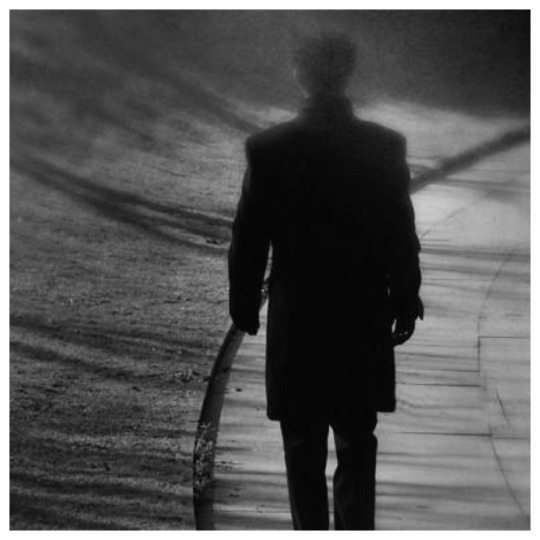
He’d finished the case last month. Two women, worried about some odd pictures they were receiving, had strolled into his marginally bleak office with the hope that he would be the answer they were looking for seen as the police had done nothing. As he had thought at the time, it had been a stalker – an overzealous fan – declaring his love for Nadia in the most unromantic and warped ways he could have mustered. And that should have been the end of it all.
Should have.
As Damien straightened the folders on his desk he thought about texting an excuse; it wouldn’t be hard. He could tell Nadia he had a case. He could tell Nadia that. Giving an excuse to Izzy, he had found over the course of this investigation, had proven a little harder.
What else would I be doing? His brain argued. Drinking tequila and replaying the last year of my life perhaps? He wasn’t sure if his mind was trying to make a case for or against him going but mulling over his discharge from his last post was neither appealing nor fun.
His phone lit up as he turned off the light to his office.
At Shenanigans. Nads is late and there is a man in a top hat talking to me. Hurry it up Sherlock.
Damien snorted. Only her, he thought as he picked up the pace down the street.
Shenanigans, as anyone would assume for a Friday, was busy but there was Izzy, at the bar, wearing a tight smile as an obviously drunken man in a comedy top hat chattered at her. “Damien!” She jumped off the stool, the moment he walked through the day and gave an apologetic glance back to the man as she bounded away. “Thank god.”
“He seems like a catch.” Damien chuckled noting how the man kept looking her way even though she’d abruptly run off. He couldn’t blame the guy he guessed. He knew too well, way too well for a month and a half, that Izzy seemed to have that effect on people – men – without her really knowing it.
“You could say he has a certain lure,” she laughed at her own joke and even though Damien tried to roll his eyes, he couldn’t help the smirk that followed. “See, I can make you laugh! I caught that.”
This time Damien did roll his eyes.
“Whatever D, that moody mask isn’t fooling me.” She handed a beer to him and leaned on the bar. He didn’t know when she had started calling him D; it made a change from the fictional detectives she often referred to him as. He should have known at that point the line was getting blurred but part of him had relished in her saying it; it had aggravated him, annoyed him and it had caused his face to scowl, twist and frown. But she hadn’t been scared off. It hadn’t stopped her. She wasn’t taking the hint and part of him so desperately needed someone who wouldn’t take the hint.
They sipped their beer in comfortable silence.
Damien had noticed it happened when they were alone. Like the first time he’d been to their apartment and Nadia wasn’t home; Izzy had made him pizza while they waited and they’d made idle chatter about who they’d invite to dinner, living or dead, if they’d had the chance. He’d chosen Babe Ruth as one and that had led to a discussion about baseball and so on. But from there, he’d found her easy to be near – talking or not. She made no demands of him. She asked no heavy questions. Izzy only told bad jokes, discussed unimportant topics and was, much to his frustration, oddly difficult to read. The utter opposite of her cousin.
Damien got the bar tender’s attention and ordered the special.
He passed her the tequila. They clinked the little glass and threw the liquid down their throats.
“Ah, tequila. It won’t fix your life, but it’s worth a shot.” Izzy winked whilst Damien groaned.
“Are you having a competition with yourself to see how many awful puns you can fit into one social interaction?”
Tucking a loose, brown curl behind her ear, Izzy pulled her mouth into a smirk. “Actually, I’m having a competition with you and you are losing massively Poirot.”
Green eyes sparkled at him, the odd shade of green that he’d noticed when they’d first met only that time the emotion in them had been mired in worry and fear. Even then, they’d been noticeable and beautiful. He’d always found her attractive, even when he should have been concentrating on the job, but he couldn’t help it; chestnut hair sat just below her shoulders in waves, olive skin, only marked by a little scar above her left eye where she’d been pecked by a rooster as a child. Of course, he would find her attractive and despite his best efforts to ignore it, he still did. Only now, he’d decided he quite liked her company too. The problem was, every other man in this building probably felt the same way; just so the universe could taunt him a little more.
This is the last time I’m coming out, he promised himself as he drank her in. I can’t do this.
“So, you’ve started without me. What a surprise!” Nadia flicked a strand of hair over a delicate shoulder and muscled in between them.
Izzy rolled her eyes and bit her bottom lip. “Consider it compensation for your lateness. I had to talk to that guy.” Her head nodded in the direction of the comedy hat guy who was now shirtless and singing ‘Mull of Kintyre’ as loud as he could. All three of them winced. “I needed that tequila.”
Nadia shook her head. “And what’s your excuse?” She looked at Damien.
“I was the bringer of tequila. And, I had to endure a hug. We all know how I feel about bodily contact.” He raised his eyebrows at his own lie before drinking his beer. He didn’t like hugs – apart from Izzy. The first time she’d hugged him, after they’d gotten drunk when the creeper had been caught, he’d panicked, maybe even tried to squirm out of it, but the second her head had rested on his chest his body had betrayed him. It had made his heart race. His arms had involuntarily clamped around her. His fingers had stroked the ends of her hair. And he had hated himself afterwards. Yet, every time she said farewell to him, she did so with a quick hug and he had not yet refused it.
“Yeah, D. I’m sure it was agony.” Nadia raised an eyebrow at him, thankfully, Izzy was distracted by the louts on the other side of the bar. Still, he froze. She knows. How does she know? He knew from the way her mouth lifted into a smirk, just on one side and how her arms folded over her chest. It told him: I’m onto you.
“What’s the plan? I am getting bad vibes in here. Like, any second Lord of the Dance is coming on and it’s all going to Hell.” Izzy’s questions shattered the unspoken conversation between them both. She noticed the look they shared and for a split second wondered what was going on.
Nadia swirled the wine around the glass. “There’s a dive bar over the road.” Her shoulders shrugged. They both looked at Damien.
He knew that bar. It had been one that he’d frequented when he’d gotten back. The one where he’d drunk until he’d almost passed out and where he’d taken home two of the barmaids (on separate occasions) and then he’d worn out his welcome. No. I can’t go in there. He breathed in deeply. This is the last time I come out. It has to be.
“I suppose this is where I leave you both.” He smiled. This time it was warm and even though Nadia heard his words, Izzy heard much more than that when she looked at his face.
“Oh, Damien, we can just go somewhere else.” Nadia started but Izzy knew better.
“I should go, seriously, I have a meeting early.”
“On a Saturday?” Nadia started.
“Nads, to be fair, you do owe me a girl’s night.” Izzy spoke, a light smile on her face and a grateful one on Damien’s. She gave him a silent welcome. Nadia’s gaze dropped back to Izzy and just like that she agreed.
As they were about to leave, Nadia left for the restroom apparently not trusting the ones at a place called the Lord Drake.
“So,” Izzy started and shoved her hands in her pockets.
Damien took in a deep breath knowing that he wouldn’t see her again. Or he’d be trying not to.
“I’ll see you around, Inspector Gadget.” Izzy chuckled and despite his best effort so did he. Just when he was about to speak, Izzy stepped forwards and wrapped her arms around his torso. His breath hitched. Even though his brain was screaming at him to stay rational, logical and sent reminders to the forefront of his brain about the last time work and professionalism became mingled, it didn’t stop him from resting his chin on her head and breathing in the scent of flowers that came from her hair. He stayed there a minute, maybe a little more. “I thought you didn’t like bodily contact.”
“Hardy Har.” He broke the hold but her hand stayed on his forearm.
“I’m giving you a pass this time. But don’t think you’ve seen the last of me Nazario. I’m persistent.” She whispered just as Nadia walked back towards them.
“I thought you didn’t do bo-”
“She already beat you to the joke Nadia.” Damien smirked when she huffed and crossed her arms.
“Fine. We’ll see you later D. Enjoy brooding.” She laughed before skipping off.
Izzy followed before turning on her heel. “Remember, one ‘get out of jail free’ card. And you just used it.”
Shit. His brain hummed. Shit, indeed.
#damien nazario#perfect match#playchoices#pixelberry#pixelberry choices#damien elvis nazario#perfectmatch#pm choices
14 notes
·
View notes
Text
The McCartney Family Album
April 6, 2008 -- The Guardian
To mark the 10th anniversary of Linda McCartney's death, Paul and daughter Mary have selected the best of her photographs for a revealing exhibition. Here, Mary tells Sean O'Hagan why the pictures are so special to her.
When I ask Mary McCartney to describe her mother's photographic style, she thinks for a long moment and says: 'She approached photography the way she approached everything else - with quiet confidence.' You can see that in the photographs spread out before us on the table of the west London members' club where McCartney has met me to talk about a forthcoming exhibition of her mother's work. The show, which opens at the James Hyman Gallery on 25 April, is the first major retrospective of Linda McCartney's photography, and has been timed to coincide with the 10th anniversary of her death from breast cancer. The photographs have been selected by Paul and Mary McCartney, with input from Hyman, from 4,000-odd contact sheets.
'It's an incredible archive,' says Mary, herself a respected fashion and portrait photographer. 'Mum never stopped taking photographs, though it may have seemed that way to the public. It's about 30 years' worth of work. The only gap is around the time when Stella and I were born when, as she said, she was up to her neck in nappies. Otherwise she always seemed to have a camera in her hand.'
To many people Linda McCartney was known, first and foremost, as the wife of a Beatle, and then as a vegetarian-cum-animal rights campaigner. Yet it is her career as a photographer, which waned as she embraced motherhood, music and activism, that is her lasting legacy.
'She was an instinctive photographer and always unobtrusive,' continues Mary. 'She wasn't that interested in straight portraiture or art photography - the images she caught were nearly always intimate, relaxed and oddly revealing.'
You can see that intimacy in her shot of John Lennon and Paul McCartney working on lyrics in the corner of a recording studio. Both are immersed in the task, but obviously having a good time. McCartney, his biro poised over a sheet of paper, may just have amended the lyrics. Lennon obviously approves. They seem almost conspiratorial and to have the intimacy of a long-term couple. Which, in a way, they were.
With the Beatles, Linda's access was assured. Before she met Paul, though, she had worked with many of the icons of the Sixties pop scene, including Jimi Hendrix, whom she famously captured mid-yawn. He didn't seem to mind.
'It was a different time,' says Mary, 'before PRs and image makers took over. Back then, she told me, the manager would often be a friend of the band. If you were cool and they liked you, you could friend hang out.'
Mary's younger sister Stella, now a celebrated fashion designer, is in one of the most intriguing family snapshots. It was taken at Paul McCartney's cottage in Scotland, near the Mull of Kintyre, which he famously hymned on one of Wings's more mawkish songs. Paul balances on a fence in dressing gown and slippers. He is watching with some concern his young son James, who has just leapt off the bonnet of the family Land Rover. Immune to the drama, Stella is kneeling on the grass in the foreground, immersed in some private reverie.
'That's Poppy, our family dog,' says Mary, pointing at a pooch in the background. There is also a sack of logs, or maybe potatoes, in the foreground near Stella. It is a detailed photograph but intricately composed: the dark, looming cottage on the right of the image, the fence that arcs away to the horizon, the tall figure of Paul echoed by what appears to be a ring of standing stones in the background on the left.
It is also a perfectly rendered moment, a deceptively casual portrait of a family caught up in one of the small dramas of the everyday. The age is given added resonance by the fact that it is a glimpse into the private life of the McCartney family at a time in the early Seventies when Paul had fled the media-fuelled madness that attended the Beatles, and by the fact that Linda is the invisible, guiding presence.
'I love that photograph,' says Mary. 'It's so weird - the dog, my brother jumping into the air, and Stella in a world of her own. I could look at it for ages. It's not set up at all; it's all about watching and timing. I bet she didn't even change the lens to take it, just used the same old 50mm lens she always did. That's what I mean about instinctive. There's a faith that it will be alright and it is. She just gets it.'
She stares at it some more, and the photographer in her gives way to the loving daughter. 'We used to walk that fence all the time to see how far we could go before we fell off. So it has all those memories, too. Our lives are mapped out in our mum's photographs. I found out her and Dad's story just by looking through the contact sheets: her rock'n'roll stuff, then her photographs of the Beatles, then her meeting Dad. It's like her diary, really, a record of her life.'
Linda Louise Eastman began her career as a photographer almost by accident. While working as a receptionist for Town & Country magazine in Manhattan in the mid-Sixties, she picked up an invite for a press party on a boat on the Hudson. It was for the Rolling Stones, newly arrived in America. She charmed the bad boys of rock as she later charmed Hendrix and Jim Morrison.
Soon afterwards, she forsook the genteel concerns of Town & Country for the more earthy delights of the Fillmore East, a celebrated but grungy New York rock venue, where she became the house photographer, capturing live images of Bob Dylan, Janis Joplin, the Doors and the Who. Before Annie Leibovitz became Rolling Stone magazine's favourite snapper, Linda was the first woman photographer to have her work on the cover - a portrait of Eric Clapton.
'Mum liked doing music work when it was all free and easy,' Mary says, 'but when the lawyers and the accountants took over, she lost interest. She was independent always. She did it on her own terms or not at all. Plus, she had children. Children take over your life.'
Contrary to received wisdom, Linda Eastman was not an heir to the Eastman Kodak empire, but she did come from wealthy American stock. Her father Lee was a music-business attorney, while her mother, Louise Sara Lindner, inherited the Lindner department-store fortune. She died in an aeroplane crash in 1962, when Linda was just 20, precipitating in her daughter a lifelong aversion to flying.
'I think Mum and Dad were close because they both lost their mothers when they were young,' says Mary. 'It was one of the things that bonded them. You could glimpse it when certain songs came on the radio, and they'd both be suddenly sad at the same time. I also think it's what made them so family-oriented.'
Family life, one suspects, is also what grounded Paul McCartney after the craziness of the Beatles years - though blissful domesticity also seemed to soften his musical brain. For a long time Linda stopped being a professional photographer to become a musician of sorts with Wings, and had to contend with the wrath of Beatles fans who blamed her and Yoko Ono - but mostly Yoko - for the fall in quality in both Paul and John's solo work. She later admitted that she sometimes sang out of tune on early Wings songs.
Paul met Linda in the famed Bag O'Nails club in London in May 1967, where the new rock aristocracy hung out, and where she was taking shots of Georgie Fame for a feature on Swinging London. That same week, they met again when the Beatles unveiled their Sergeant Pepper album at a party in their manager Brian Epstein's Belgravia pad. In September 1968 Paul asked Linda to fly to London for a date. They married six months later. Mary was born in August 1969. On the back of her father's first solo album, McCartney, she is the curious infant peeking out of her father's jacket straight at her mother's lens.
'It's a beautiful moment, isn't it?' Mary says. Does she remember much about her childhood in Scotland? 'Oh God, yeah! I remember we'd go off exploring a lot, Stella and me, and we didn't have to be watched all the time.' It's a revealing memory, a reminder that they were still the children of one of the most famous pop stars in the world and had to be protected accordingly.
How big an influence is her mother on her own photographic style? 'I'm not sure. It was more her attitude I admired. She was feisty in her own way, but not in a big, in-your-face way. I suppose she was quietly persuasive. It took me a long time to even get to that point. I used to be so green when I started, almost apologetic. I'm more like her in the way I approach my personal projects: just me and the camera and a few rolls of film. She gave me loads of advice all the time and I really miss that, chatting and arguing over the contact sheets. I remember when I used to moan about missing a great moment, a great photograph, she'd say: "Oh, don't worry, it's in your soul camera." I think she really believed that.'
Was it hard to be the child not just of famous parents, but parents who were seen as alternative types - hippies, vegetarians, animal rights activists? 'Well, my friend Josie used to call us hippy convoy kids,' she laughs. 'We were tomboys, that was down to Mum. She was a bit anti-authority, a bit rebellious. At the local comprehensive in Rye I tried to blend in but Mum and Dad would turn up in the Land Rover with the rainbow-stripe fabric on the seats. The rock hippy parents! I did the whole thing of being embarrassed as a teenager. I'd look at her odd stripy socks and go: "You're not going out dressed like that, Mum!" Now I think it's beautiful. Like the way she cut her own hair. It's quite cool, really.'
There is a powerful self-portrait of Linda towards the end of her life in Francis Bacon's studio. I ask Mary if this was the last image taken of her mother before she died. 'No,' she says haltingly. 'I think I took the last photographs of her. I was working on the press pictures for her cookbook. I think the very last one was a close-up where she is looking deep into the lens. Really intimate and poignant. The thing is,' she says, tears welling up, 'I don't think she ever saw it.'
As she composes herself, she sorts through the images. 'That's the thing about photographs,' she says. 'They are wonderful reminders of things, but they also carry memories, sadness.'
It must have been an emotional experience to sort through her mother's archive for the show. 'In one way it was, but in another it was satisfying. Me and Dad have a proper grown-up relationship now. I feel I was a kid for so long, but now we have both been through a lot. We're both divorcés, for a start,' she says, laughing mischievously.
Though I had been warned that the words Heather Mills were not to be even mentioned, it seemed an opportune moment to utter them. Did you, I ask, gritting my teeth, ever do a portrait of her? 'No,' she says, looking perplexed at the very thought. 'No. Not really. I didn't.' Funny that, I say, but she does not respond. The silence, though, says enough. In more ways than one, she is her mother's daughter.
Linda McCartney's photographs will be at the James Hyman Gallery, 5 Savile Row, London W1 (020 7494 3857) from 25 April to 19 July
#mary McCartney#article#Photography#Linda McCartney#Paul McCartney#Stella McCartney#James McCartney#Heather Mills#family
8 notes
·
View notes